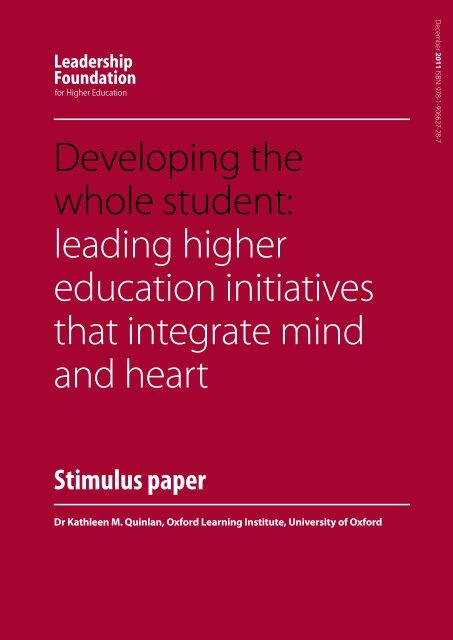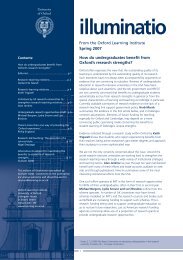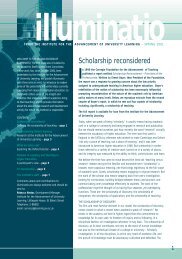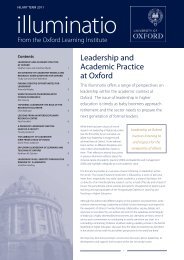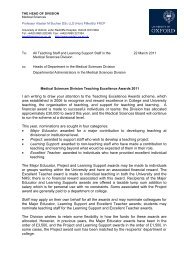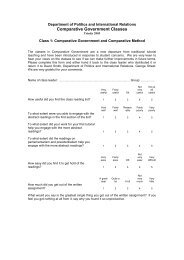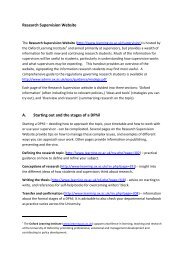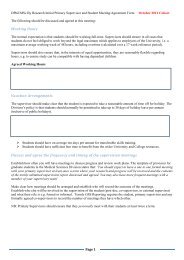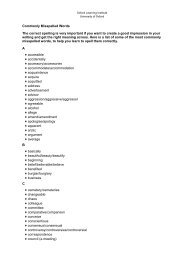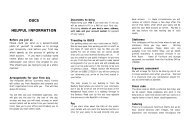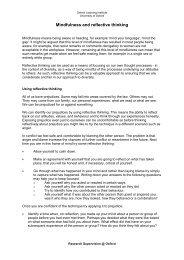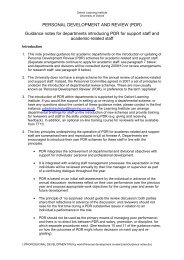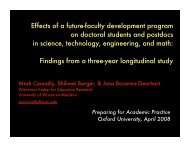Developing the whole student - Oxford Learning Institute - University ...
Developing the whole student - Oxford Learning Institute - University ...
Developing the whole student - Oxford Learning Institute - University ...
You also want an ePaper? Increase the reach of your titles
YUMPU automatically turns print PDFs into web optimized ePapers that Google loves.
<strong>Developing</strong> <strong>the</strong><br />
<strong>whole</strong> <strong>student</strong>:<br />
leading higher<br />
education initiatives<br />
that integrate mind<br />
and heart<br />
December 2011 ISBN: 978-1-906627-28-7<br />
Stimulus paper<br />
Dr Kathleen M. Quinlan, <strong>Oxford</strong> <strong>Learning</strong> <strong>Institute</strong>, <strong>University</strong> of <strong>Oxford</strong>
Stimulus Paper Series<br />
The Leadership Foundation is pleased to launch its new series of<br />
‘Stimulus Papers’ which are intended to inform thinking, choices and<br />
decisions at institutional and system levels in UK higher education.<br />
The papers were selected from an open tender which sought to<br />
commission focused and thought-provoking papers that address<br />
<strong>the</strong> challenges facing leaders, managers and governors in <strong>the</strong> new<br />
economic environment facing <strong>the</strong> UK.<br />
The <strong>the</strong>mes addressed fall into different clusters including higher<br />
education leadership, business models for higher education, leading<br />
<strong>the</strong> <strong>student</strong> experience and leadership and equality of opportunity<br />
in higher education. We hope <strong>the</strong>se papers will stimulate discussion<br />
and debate, as well as giving an insight into some of <strong>the</strong> new and<br />
First Published in December 2011<br />
Leadership Foundation for Higher Education<br />
Published by <strong>the</strong> Leadership Foundation for Higher Education<br />
Registered and operational address:<br />
Leadership Foundation for Higher Education<br />
First Floor, Holborn Gate<br />
330 High Holborn<br />
London, WC1V 7QT<br />
England<br />
Tel: +44 (0)20 7849 6900<br />
Fax: +44 (0)20 7849 6901<br />
E-mail: info@lfhe.ac.uk<br />
www.lfhe.ac.uk<br />
© Leadership Foundation for Higher Education<br />
All rights reserved. No part of this publication may be<br />
reproduced or transmitted in any form or by any means,<br />
electronic or mechanical, including photocopy, recording<br />
or any information storage and retrieval system, without<br />
prior permission in writing from <strong>the</strong> copywrite owner.<br />
ISBN: 978-1-906627-28-7<br />
Designed & produced by The Print Connection<br />
Printed in <strong>the</strong> United Kingdom
Foreword Professor Craig Mahoney,<br />
Chief Executive, Higher Education Academy<br />
Higher education in <strong>the</strong> UK is one of <strong>the</strong> great success stories of <strong>the</strong> past 20 years.<br />
It has expanded in line with government policy and provided individuals, companies and<br />
UK governments’ access to knowledge for <strong>the</strong> creation of wealth in many forms, to change<br />
opinion and to enable economic growth. However during <strong>the</strong> early part of <strong>the</strong> 21st century<br />
we have also seen huge pressure on education, government funding and <strong>the</strong> personal<br />
circumstances of individuals, families, companies and <strong>the</strong> UK.<br />
“Higher education<br />
must also be<br />
clear about how<br />
it supports <strong>the</strong><br />
relationship<br />
between <strong>student</strong>s<br />
and society.”<br />
Professor Craig Mahoney<br />
Perhaps now, more than ever, this publication, <strong>Developing</strong> <strong>the</strong> Whole Student:<br />
Leading Higher Education Initiatives that Integrate Mind and Heart by Kathleen Quinlan<br />
provides us with an opportunity to reflect on what constitutes <strong>the</strong> development of a well<br />
rounded <strong>student</strong> learning experience. As leaders in institutions and as educators, we must<br />
ensure that knowledge acquisition, toge<strong>the</strong>r with personal growth and development,<br />
remain a central part of <strong>student</strong>s’ education - to create lifelong learners not only possessing<br />
higher level academic skills and discerning information literacy skills, but also excellent<br />
transferable skills and appropriate graduate attributes. Higher education must also be<br />
clear about how it supports <strong>the</strong> relationship between <strong>student</strong>s and <strong>the</strong> wider society<br />
in which <strong>the</strong>y live and this report provides useful insights into how a holistic <strong>student</strong><br />
experience can be created and led, particularly drawing on research evidence in <strong>the</strong> US.<br />
There is a need to build such an evidence base in <strong>the</strong> UK. This is a timely and well written<br />
report that I strongly commend to those interested in higher education and in <strong>student</strong><br />
learning and development.
01 <strong>Developing</strong> <strong>the</strong> <strong>whole</strong> <strong>student</strong>: leading higher education initiatives that integrate mind and heart<br />
Contents<br />
Executive summary 02<br />
Introduction 05<br />
I UK Context<br />
I Questions to be addressed<br />
Responses to key questions 07<br />
I What is meant by ‘developing <strong>the</strong> <strong>whole</strong> <strong>student</strong>’?<br />
I To what extent does a university experience influence <strong>student</strong>s’ holistic development?<br />
I What educational activities support this type of development?<br />
I What leadership is required for such initiatives?<br />
I What are <strong>the</strong> likely leadership challenges, pitfalls and lessons?<br />
Conclusion 19<br />
Acknowledgments 19<br />
Bibliography 20<br />
Biography 25
Stimulus paper by Kathleen M. Quinlan 02<br />
Executive Summary<br />
1<br />
Palmer et al (2010)<br />
In addition to influencing <strong>student</strong>s’ knowledge base, thinking abilities and skills, higher<br />
education offers <strong>the</strong> opportunity to promote o<strong>the</strong>r aspects of <strong>student</strong>s’ growth as people.<br />
Higher education has an important role in shaping our future society because today’s<br />
university <strong>student</strong>s will be tomorrow’s doctors, engineers, business managers, teachers,<br />
faith leaders, politicians, citizens, activists, parents and neighbours. While <strong>the</strong>y need to<br />
be able to demonstrate key skills and knowledge to enact those roles effectively, <strong>the</strong>y<br />
must also demonstrate personal and social responsibility in carrying <strong>the</strong>m out. A focus<br />
on holistic <strong>student</strong> development may be particularly timely in addressing <strong>the</strong> current<br />
challenges <strong>the</strong> sector, and society, faces.<br />
While much of <strong>the</strong> current political discourse about higher education is instrumental<br />
and economic, this paper aims to lay <strong>the</strong> foundation for a discourse focused on <strong>student</strong><br />
development. It puts forward a conceptual framework for leadership of learning and<br />
teaching in higher education, assuming we need to contextualise leadership, by focusing<br />
specifically on leadership of something for something. In this case, <strong>the</strong> argument is for<br />
leadership of teaching and learning for <strong>the</strong> purpose of promoting <strong>student</strong>s’ holistic<br />
development. To support leaders’ understanding of <strong>the</strong> key issues in holistic <strong>student</strong><br />
development and <strong>the</strong> leadership implications of embracing such an educational purpose,<br />
<strong>the</strong> paper syn<strong>the</strong>sises literature from a variety of spheres that answers five key questions.<br />
A brief summary of responses to each question is provided here.<br />
What is meant by ‘developing <strong>the</strong> <strong>whole</strong> <strong>student</strong>’ and how might this<br />
general aim fit within <strong>the</strong> current UK higher education context?<br />
The notion of holistic <strong>student</strong> development encompasses not only learning academic<br />
knowledge and skills, such as problem-solving and analysis, but also o<strong>the</strong>r aspects of<br />
<strong>student</strong>s as people who are growing and maturing affectively (emotionally) and morally.<br />
Across a variety of related literature, a few common <strong>the</strong>mes emerge:<br />
I Going beyond knowledge and skills to include o<strong>the</strong>r aspects of being a person in<br />
society (such as emotion, spirituality, moral judgement, embodiment).<br />
I An integrative view of learning and development that emphasises <strong>the</strong> connections<br />
and relationships between thinking, feeling and action, ra<strong>the</strong>r than separating cognitive<br />
dimensions of education from affective or moral dimensions.<br />
In advocating a broader view of <strong>the</strong> educational process, <strong>the</strong>y also challenge – ei<strong>the</strong>r<br />
explicitly or implicitly – <strong>the</strong> purposes of education. While several different studies<br />
are referenced that offer language around character, virtues and personal and social<br />
responsibility, a tight definition of holistic development might be counterproductive to<br />
opening a conversation about alternative ways of conceptualising higher education’s role<br />
in relation to its <strong>student</strong>s 1 . Different aspects of development may be more important in<br />
different contexts. Opening a conversation enables a community to choose <strong>the</strong> concepts<br />
and associated language that best capture its values and priorities.
03 <strong>Developing</strong> <strong>the</strong> <strong>whole</strong> <strong>student</strong>: leading higher education initiatives that integrate mind and heart<br />
2<br />
Pascarella and Terenzini (2005)<br />
3<br />
Colby et al (2003)<br />
4<br />
Mezirow and Taylor (2009)<br />
5<br />
Robinson et al (2008)<br />
To what extent does a university experience influence <strong>student</strong>s’<br />
holistic development?<br />
There is a rich tradition of research in <strong>student</strong> development in higher education in <strong>the</strong> USA,<br />
although <strong>the</strong>re is very little in <strong>the</strong> UK or o<strong>the</strong>r anglophone countries. In American higher<br />
education, <strong>student</strong>s’ attitudes and values change in many ways, including greater cultural,<br />
aes<strong>the</strong>tic and intellectual sophistication; greater openness and ‘o<strong>the</strong>r-person’ orientation;<br />
greater humanitarian and altruistic values; greater likelihood of civic involvement and more<br />
positive attitudes toward racial equality and tolerance; greater understanding of o<strong>the</strong>r<br />
cultures and more egalitarian sex-roles. Students also make significant gains during <strong>the</strong><br />
university years in <strong>the</strong>ir level of principled moral reasoning 2 . Additional research is needed<br />
in <strong>the</strong> UK to determine <strong>the</strong> extent to which <strong>the</strong> UK’s educational systems foster <strong>the</strong>se kinds<br />
of effects on <strong>student</strong>s.<br />
What educational activities support this type of development?<br />
The same kinds of educational activities that are known to support traditional dimensions<br />
of academic understanding are even more important in helping <strong>student</strong>s to develop<br />
<strong>the</strong>ir values, sense of self, identity and purpose 3 . A key ingredient is <strong>the</strong> use of active<br />
pedagogies such as service learning, problem-based learning and discussion of moral<br />
dilemmas in <strong>the</strong> discipline. Interaction with diverse peers is also a vital aspect of <strong>the</strong><br />
higher education experience. Exposing <strong>student</strong>s to new experiences and perspectives –<br />
whe<strong>the</strong>r in <strong>the</strong> classroom, community, halls of residence, field trips, study abroad – and<br />
providing opportunities to reflect on those in dialogue with o<strong>the</strong>rs offer powerful learning<br />
experiences that shape people’s development 4 . Specialised curricula such as women’s<br />
studies and ethnic studies courses also influence <strong>student</strong>s’ attitudes and awareness of<br />
self-in-society.<br />
What leadership is required?<br />
This paper proposes that <strong>the</strong>re are three main spheres of leadership that are needed to<br />
promote holistic <strong>student</strong> development, which are illustrated visually. First, leaders are in a<br />
position to create supportive environments for <strong>student</strong> development by helping to foster<br />
organisational conditions in which <strong>student</strong>s can grow holistically. To do so, <strong>the</strong>y need to<br />
attend to and align <strong>the</strong> culture of <strong>the</strong> institution, <strong>the</strong> curriculum, <strong>the</strong> co-curriculum and <strong>the</strong><br />
sense of campus community. Second, leaders need to focus on <strong>the</strong>ir own inner lives – <strong>the</strong>ir<br />
senses of self – so that <strong>the</strong>y are modelling lives of purpose, meaning and integrity. Third,<br />
returning to a key assumption underpinning this paper, knowledge of and involvement<br />
in <strong>the</strong> specific curricular and teaching strategies that can promote holistic <strong>student</strong><br />
development (as discussed in <strong>the</strong> previous section) is an essential, although under-discussed,<br />
aspect of leadership in higher education. This paper follows Robinson et al’s 5 call for linking<br />
educational leadership to evidence of effective learning and teaching. The leadership<br />
model presented in this paper integrates <strong>the</strong> various aspects of leadership needed to create<br />
universities that intentionally promote holistic <strong>student</strong> development. The paper highlights<br />
<strong>the</strong> content and context of leadership, emphasising not leadership or even leadership in<br />
higher education generally, but leadership of learning and teaching (by explicitly including<br />
knowledge and evidence related to this core business) for holistic <strong>student</strong> development<br />
(a proposed purpose of higher education). These three components link organisational<br />
development with <strong>the</strong> development of leaders as people who are in relationship with o<strong>the</strong>r<br />
members of <strong>the</strong> community and educational development. These aspects of leadership<br />
interact and mutually reinforce each o<strong>the</strong>r; congruence among <strong>the</strong>m is vital. The model also<br />
acknowledges <strong>the</strong> larger context within which universities are embedded.
Stimulus paper by Kathleen M. Quinlan 04<br />
What are <strong>the</strong> likely leadership challenges, pitfalls and lessons for those<br />
wishing to implement programmes with <strong>the</strong>se goals in <strong>the</strong> UK higher<br />
education context?<br />
Each of <strong>the</strong> aspects of leadership highlighted in Section 3.4 throws up potential<br />
challenges. In addition, <strong>the</strong> wider socio-cultural and political contexts of higher education<br />
also present challenges. Higher education is currently a contested and conflicted sector;<br />
while <strong>the</strong>se difficult times present us with an opportunity to re-examine our values, <strong>the</strong><br />
values underlying this paper run counter to <strong>the</strong> current climate. In addition, making major<br />
changes in times of resource constraint is difficult. Leaders may encounter resistance<br />
couched in a variety of different critiques and must be prepared to bring conversations<br />
back to a learning and <strong>student</strong> development focus. This paper tries to introduce a different<br />
discourse, but if that new discourse is used in service of marketisation pressures to fur<strong>the</strong>r<br />
commodify higher education, we risk corrupting <strong>the</strong> very heart of <strong>the</strong> idea. The best<br />
rationale for promoting holistic <strong>student</strong> development may be quite simply that it is a right<br />
and good thing to do – yet, such an argument is difficult to sustain on its own against a<br />
rising tide of external demands on <strong>the</strong> sector.
05 <strong>Developing</strong> <strong>the</strong> <strong>whole</strong> <strong>student</strong>: leading higher education initiatives that integrate mind and heart<br />
6<br />
Arthur (2005)<br />
7<br />
Dearing (1997)<br />
8<br />
Department for Business,<br />
Innovation and Skills (2009),<br />
Browne (2010)<br />
9<br />
Barnett and Coates (2005),<br />
Walker (2006)<br />
10<br />
Maxwell (1976), Maxwell (1984),<br />
Arthur (2005), Arthur and<br />
Bohlin (2005), Walker (2006),<br />
Barnett (2007), Maxwell (2007),<br />
Nixon (2009)<br />
11<br />
Pascarella and Terenzini (2005)<br />
12<br />
Colby, Ehrlich et al (2003),<br />
Dey (2008)<br />
13<br />
Ehrlich (2000)<br />
14<br />
Braskamp, Trautvetter et al<br />
(2006), Braskamp, Trautvetter et<br />
al (2008)<br />
15<br />
Sullivan and Rosin (2008)<br />
16<br />
Sternberg, Reznitskaya et al<br />
(2008)<br />
17<br />
Beaty and Henry (2007)<br />
18<br />
Pascarella, Ethington and<br />
Smart (1988), Gaudiani (1997),<br />
Heffernan (2001), Hartley,<br />
Saltmarsh et al (2010)<br />
19<br />
Department for Business,<br />
Innovation and Skills (2011)<br />
20<br />
Bolden (2011)<br />
21<br />
Ertl and Wright (2008)<br />
22<br />
Pope (2006)<br />
Introduction<br />
Today’s university <strong>student</strong>s will be tomorrow’s doctors, engineers, business managers teachers,<br />
faith leaders, politicians, citizens, activists, parents and neighbours. While <strong>the</strong>y need to be<br />
able to demonstrate key skills and knowledge to enact those roles effectively, <strong>the</strong>y must also<br />
demonstrate good character in carrying out <strong>the</strong>ir responsibilities. The role of higher education in<br />
developing character was affirmed in each of <strong>the</strong> <strong>University</strong> Grants Committee Reports in 1948,<br />
1952 and 1964 6 . The Dearing Report 7 emphasises <strong>the</strong> development of people and a ‘learning<br />
society’ as central to <strong>the</strong> aims of higher education, though <strong>the</strong> language was shifting. In recent<br />
history, <strong>the</strong> terminology of ‘character’ or ‘morals’ has rarely been invoked in higher education.<br />
While <strong>the</strong>re tends to be greater commitment to <strong>the</strong>se educational purposes in secondary and<br />
primary education, <strong>the</strong> acculturating role of higher education in ‘civilised society’ has been given<br />
only passing reference in <strong>the</strong> past decade 8 . Instead, as Barnett and Coats 9 have argued, moral<br />
and social aims of higher education have been overshadowed by emphases on instrumental and<br />
economic goals, including employability skills and preparation for <strong>the</strong> workplace.<br />
With a few notable exceptions in <strong>the</strong> academic literature 10 <strong>the</strong>re is relatively little discourse in <strong>the</strong><br />
UK about <strong>the</strong> ways that higher education can support not only intellectual development, but <strong>the</strong><br />
development of <strong>the</strong> <strong>whole</strong> <strong>student</strong>. In contrast, <strong>the</strong>re has been increased attention in <strong>the</strong> USA in<br />
<strong>the</strong> past 15 years to <strong>the</strong> effects of university education on such aspects of <strong>student</strong> development<br />
as <strong>student</strong>s’ values and attitudes 11 , ‘personal and social responsibility’ 12 , ‘civic responsibility’ 13 ,<br />
holistic <strong>student</strong> development 14 , ‘responsible judgement’ 15 , ‘wisdom’ 16 , ‘moral formation’ 17 and<br />
service learning 18 .<br />
UK context<br />
The current climate of higher education in <strong>the</strong> UK may offer opportunities for innovations<br />
in educating for <strong>whole</strong> <strong>student</strong> development. Universities are under increasing pressure<br />
to demonstrate <strong>the</strong>ir value 19 : to <strong>student</strong>s and <strong>the</strong>ir families who are paying higher fees, to<br />
governments in an era of increasing accountability and to <strong>the</strong> public at large. In <strong>the</strong> current UK<br />
higher education landscape, value justifications are usually sought in economic terms. Yet a<br />
focus on ‘returns on investment’ and increasing employability (while undoubtedly important)<br />
do not adequately capture <strong>the</strong> broader and, arguably, more important social contributions<br />
higher education can make. The economic discourse is often disheartening for academics as<br />
many of <strong>the</strong>m feel pulled away from <strong>the</strong>ir own personal value centres by <strong>the</strong> priorities that seem<br />
to dominate <strong>the</strong> current context 20 . Simultaneously, increased attention is paid to <strong>the</strong> ‘<strong>student</strong><br />
experience’ 21 , although this notion is still underdeveloped, particularly in <strong>the</strong> UK.<br />
A focus on holistic <strong>student</strong> development may be particularly timely in addressing <strong>the</strong> current<br />
challenges <strong>the</strong> sector faces. Recent interest in university ‘branding’ can be redirected from a<br />
marketing exercise to an opportunity for a university genuinely to articulate core institutional<br />
values. Institutions can take this opportunity to clarify how <strong>the</strong>y help <strong>student</strong>s create meaningful<br />
lives that integrate interests of <strong>the</strong> head with passions of <strong>the</strong> heart. In <strong>the</strong> competitive<br />
American higher education market, small HEIs have created niches and pockets of excellence<br />
in unexpected places, gaining national attention through guidebooks such as those by Pope 22 ,<br />
which extols <strong>the</strong> virtues of 40 colleges that ‘change lives’. Several small colleges are noted for<br />
<strong>the</strong>ir roles in instilling values. Most focus on <strong>the</strong> personal development of <strong>the</strong>ir <strong>student</strong>s. All are<br />
highly <strong>student</strong>-centred. With over 100,000 copies of Pope’s book sold, it appears that initiatives
Stimulus paper by Kathleen M. Quinlan 06<br />
that focus on <strong>whole</strong> <strong>student</strong> development are attractive to <strong>student</strong>s and <strong>the</strong>ir families. Indeed,<br />
research on school choice in both Europe and <strong>the</strong> USA also shows that parents choose faithbased<br />
schools because <strong>the</strong>y provide a strong foundation for <strong>whole</strong> <strong>student</strong> development<br />
through clear, distinct commitments to a set of well-articulated guiding values, ra<strong>the</strong>r than<br />
for <strong>the</strong> religious content per se 23 . Thus both faith-based and secular universities could use this<br />
opportunity to articulate <strong>the</strong>ir commitments to <strong>student</strong>s on <strong>the</strong>ir own terms.<br />
Using this historic moment in UK higher education to refocus attention on holistic <strong>student</strong><br />
development may also boost academic morale. Creating an institutional environment aligned<br />
to <strong>student</strong>s’ holistic development (however defined) would enable academics to reconnect<br />
with <strong>the</strong> core values and interests that brought <strong>the</strong>m to teaching and reinvigorate commitment<br />
to a common cause. Palmer 24 has been a leader in calling for ‘renewal’ of <strong>the</strong> academy through<br />
attention to integrative education that helps <strong>student</strong>s ‘become more fully developed human<br />
beings’ 25 . He focuses on changing <strong>the</strong> academy through collegial conversation; it is central to<br />
how <strong>the</strong> academy works and can be an essentially humanising process. In <strong>the</strong> UK, Maxwell has<br />
been a long-standing proponent of an orientation to academic work which ‘... puts <strong>the</strong> mind in<br />
touch with <strong>the</strong> heart, and <strong>the</strong> heart in touch with <strong>the</strong> mind, so that we may acquire heartfelt<br />
minds, and mindful hearts’ 26 .<br />
23<br />
Glenn (2005)<br />
24<br />
Palmer (2000), Palmer,<br />
Zajonc et al (2010)<br />
25<br />
Palmer (2010) p2<br />
26<br />
Maxwell (1976)<br />
27<br />
Robinson, Lloyd et al (2008)<br />
Questions to be addressed<br />
If universities take <strong>the</strong> lead in re-articulating <strong>the</strong>ir core commitments and <strong>the</strong>ir relationship with<br />
<strong>student</strong>s and society, <strong>the</strong>y can communicate <strong>the</strong>ir value in broader terms and, potentially, assert<br />
<strong>the</strong>ir moral authority as a sector. This paper lays <strong>the</strong> foundation for a new discourse of <strong>student</strong><br />
development and offers a framework for understanding how to create rich <strong>student</strong> experiences<br />
by briefly addressing five key questions:<br />
1. What is meant by ‘developing <strong>the</strong> <strong>whole</strong> <strong>student</strong>’ and why would higher education<br />
embrace this educational purpose?<br />
2. To what extent does a university experience influence <strong>student</strong>s’ holistic development?<br />
3. What educational activities support this type of development?<br />
4. What leadership is required?<br />
5. What are <strong>the</strong> likely leadership challenges, pitfalls and lessons for those wishing to<br />
implement programmes with <strong>the</strong>se goals in <strong>the</strong> UK higher education context?<br />
This approach, and <strong>the</strong> substantial focus in Questions 1 to 3 on educational processes, is<br />
based on <strong>the</strong> assumption that we need to contextualise leadership, by focusing specifically on<br />
leadership of something for something. In this case, <strong>the</strong> argument is for leadership of teaching for<br />
<strong>the</strong> purpose of promoting <strong>student</strong>s’ holistic development. Drawing on <strong>the</strong> notion of instructional<br />
leadership in school settings 27 , this paper assumes that leaders need an understanding of<br />
learning processes and must be involved actively in leading educational enhancement efforts.<br />
In <strong>the</strong> following sections, we consider each of <strong>the</strong>se questions in turn to build a solid foundation<br />
upon which leaders can work alongside <strong>the</strong>ir colleagues in creating learning environments that<br />
take a broader view of <strong>the</strong> <strong>student</strong> learning experience.<br />
The paper syn<strong>the</strong>sises and interprets existing, but often unconnected, literatures, including <strong>the</strong><br />
large body of literature on <strong>student</strong> development in higher education in <strong>the</strong> USA (because <strong>the</strong>re<br />
is very little research focused on <strong>student</strong> development in <strong>the</strong> UK and o<strong>the</strong>r English-speaking<br />
countries) and some research on leadership in primary and secondary schools (because research<br />
on schools leadership is much more extensive than on higher education leadership).
07 <strong>Developing</strong> <strong>the</strong> <strong>whole</strong> <strong>student</strong>: leading higher education initiatives that integrate mind and heart<br />
28<br />
Arthur, Wilson et al (2009)<br />
29<br />
Harland and Pickering (2011)<br />
30<br />
Beaty and Henry (2007)<br />
31<br />
Colby, Ehrlich et al (2003)<br />
32<br />
Grootenboer (2010)<br />
33<br />
Dey (2008), Dey, Antonaros<br />
et al (2009)<br />
34<br />
Braskamp, Trautvetter et al<br />
(2006), Braskamp, Trautvetter<br />
et al (2008)<br />
35<br />
For instance, moral formation<br />
is typically associated with faith<br />
formation and, as such, is more<br />
readily embraced in faith-based<br />
institutions. Values education is<br />
a term also closely associated<br />
with religious education in <strong>the</strong><br />
nomenclature of UK secondary<br />
schools. Holistic development,<br />
as Braskamp et al (2006) use<br />
<strong>the</strong> term, also includes physical<br />
well-being and faith, spirituality<br />
and religious commitments. I<br />
present <strong>the</strong> variety of terms as<br />
a conversation starter, knowing<br />
that <strong>the</strong> terms are politicised and<br />
some will resonate in particular<br />
contexts, where o<strong>the</strong>rs will not.<br />
36<br />
Jones and Abes (2004), Nash<br />
(2008), Temple and Ylitalo (2009)<br />
Responses to key<br />
questions<br />
What is meant by ‘developing <strong>the</strong><br />
<strong>whole</strong> <strong>student</strong>’?<br />
The notion of holistic <strong>student</strong> development encompasses academic learning and<br />
<strong>the</strong> development of skills such as problem-solving and analysis while simultaneously<br />
recognising o<strong>the</strong>r aspects of <strong>student</strong>s as people who are growing and maturing affectively<br />
(emotionally) and morally. There are a number of different terms associated with this<br />
educational philosophy, including character education 28 values education 29 , moral<br />
education/formation 30 , educating for citizenship 31 , affective education 32 and educating for<br />
social and personal responsibility 33 , as well as holistic education 34 . Thus relevant studies<br />
may focus on values, attitudes, beliefs, virtues, character, moral, spiritual or affective<br />
outcomes. Despite differences in terminology and nuances of meaning 35 , <strong>the</strong>re is a set<br />
of common principles underlying <strong>the</strong>se terms. All of <strong>the</strong>m emphasise going beyond<br />
knowledge and skills to include o<strong>the</strong>r aspects of being a person in society. Most authors<br />
espouse an integrative view, emphasising <strong>the</strong> connections and relationships between<br />
thinking, feeling and action, ra<strong>the</strong>r than separating cognitive dimensions of education<br />
from affective or moral dimensions. They all emphasise moral dimensions of higher<br />
learning, arguing that <strong>the</strong> academy has an obligation to guide <strong>student</strong>s in developing a<br />
sense of personal and social responsibility. In advocating a broader view of <strong>the</strong> educational<br />
process, <strong>the</strong>y also challenge – ei<strong>the</strong>r explicitly or implicitly – <strong>the</strong> purposes of education,<br />
typically protesting against economic and managerial discourses. Such discourses reduce<br />
<strong>student</strong>s to consumers or to packaged products with a set of specifications (‘graduate<br />
attributes’). While promoting holistic <strong>student</strong> development is likely to help <strong>student</strong>s gain<br />
‘transferable skills’ that will make <strong>the</strong>m better employees, <strong>the</strong> discourse of employability<br />
alone is insufficient and threatens to undermine attention to <strong>student</strong>s as people. Instead,<br />
a discourse that focuses on <strong>student</strong>s’ development of personal and social responsibility –<br />
central to most of <strong>the</strong> various terms mentioned above – reminds us of <strong>the</strong> much broader<br />
responsibility of universities to society.<br />
Why holistic <strong>student</strong> development in higher education?<br />
There is wider interest in and support for this type of educational philosophy within<br />
primary and secondary schooling than within higher education, for a variety of reasons,<br />
including that it is generally easier to accept <strong>the</strong> socialising role of education when<br />
dealing with children than with adults. But <strong>the</strong>re are good reasons to focus on it in higher<br />
education, too.<br />
Authors in this tradition appeal to a broader set of societal needs, pointing to <strong>the</strong> litany of<br />
social problems <strong>the</strong> world faces, ranging from poverty to war to climate change to social<br />
injustices 36 . Graduates of higher education are tomorrow’s leaders and <strong>the</strong> troubled world<br />
needs ‘leaders for good’.<br />
Higher education is a time of transition and change for all its <strong>student</strong>s. Developmentally,<br />
young adulthood is a time of change, in which <strong>student</strong>s are grappling with identity and
Stimulus paper by Kathleen M. Quinlan 08<br />
intimacy 37 and shifting from relying on o<strong>the</strong>rs to self-authorship 38 . Students in higher<br />
education confront new ideas and ways of thinking as <strong>the</strong>y interact with <strong>student</strong>s from<br />
o<strong>the</strong>r backgrounds. Mature <strong>student</strong>s may be at a different developmental stage, but<br />
<strong>the</strong>y are still in a turbulent transition period in which existing views are challenged and<br />
identities are re-made. Indeed, it is plausible that higher education is even more disruptive<br />
because established adults have made bigger investments in <strong>the</strong>ir pre-university identities,<br />
life choices and beliefs. No matter <strong>the</strong>ir age, <strong>the</strong> focus on critical thinking in Western higher<br />
education prompts <strong>student</strong>s to question received wisdom, including value positions<br />
taught by <strong>the</strong>ir families, and practised in <strong>the</strong>ir home communities or workplaces. So<br />
<strong>student</strong>s are in a time of change, in which <strong>the</strong>y must not only deconstruct old meanings<br />
and ways of making meaning, but reconstruct a sense of purpose in <strong>the</strong>ir own life that<br />
integrates expanded perspectives and worldviews 39 . In this sense, <strong>the</strong>re is also a dimension<br />
of spirituality involved in holistic <strong>student</strong> development insofar as spirituality is defined<br />
broadly as connection with something larger than oneself.<br />
Finally, it is argued that higher education does pass on values, whe<strong>the</strong>r we acknowledge it<br />
explicitly or not. Each subject has its own set of operating assumptions and standards that<br />
define what is better or worse or valid or invalid from a disciplinary viewpoint. It is better<br />
to be explicit about <strong>the</strong> values we are seeking to instil, as <strong>the</strong>se can <strong>the</strong>n be subject to <strong>the</strong><br />
kind of questioning that is <strong>the</strong> hallmark of higher education 40 .<br />
Building a vocabulary<br />
Attention to values in higher education often provokes dispute from academics because it<br />
seems to suggest teaching <strong>student</strong>s a particular right way of doing things or thinking. Such<br />
an educational goal is objectionable because: 1) a respect for pluralism and cultural diversity<br />
makes it difficult to advocate one particular value over ano<strong>the</strong>r; 2) it smacks of indoctrination,<br />
which seems to contradict <strong>the</strong> sine qua non of higher education, critical thinking 41 .<br />
37<br />
Erikson (1959)<br />
38<br />
Baxter Magolda (2009)<br />
39<br />
Parks (2000)<br />
40<br />
Grootenboer (2010)<br />
41<br />
Some educational philosophers<br />
argue cogently that moral<br />
instruction is not synonymous<br />
with indoctrination: Tan (2004),<br />
Merry (2005)<br />
42<br />
Macfarlane (2004), Nixon (2009)<br />
43<br />
Macfarlane (2004)<br />
44<br />
Arthur, Wilson et al (2009)<br />
45<br />
Peterson and Seligman (2004)<br />
46<br />
Seligman (2003)<br />
Ra<strong>the</strong>r than teaching a set of rules, principles or standards of behaviour, virtue ethics might<br />
be a more fruitful way of thinking about moral development in higher education 42 . Virtues<br />
‘focus on <strong>the</strong> character of <strong>the</strong> individual (and) are <strong>the</strong> excellences of character that enable<br />
one to achieve <strong>the</strong> “good” life’ 43 . Thus <strong>the</strong> terms ‘virtues’ or ‘character strengths’ locate <strong>the</strong><br />
qualities in <strong>the</strong> people, which is more consistent with <strong>the</strong> overarching <strong>the</strong>me of holistic<br />
<strong>student</strong> development. To UK <strong>student</strong>s and employers, good character is about ‘good<br />
morals and right behaviour’ and includes <strong>the</strong> virtues of empathy, tolerance, care of o<strong>the</strong>rs,<br />
capacity for friendship, honesty, reliability, sincerity, trustworthiness and integrity 44 .<br />
Peterson and Seligman 45 identified a common set of six ubiquitous virtues across <strong>the</strong><br />
world’s major religions and philosophies: wisdom and knowledge; courage; love and<br />
humanity; justice; temperance; and spirituality and transcendence. Each of <strong>the</strong>se six<br />
broad, abstract ideas has several routes to it (which <strong>the</strong>y call character strengths) through<br />
which we achieve <strong>the</strong> virtues. Character strengths, as learnable (acquirable) moral traits<br />
(ie enduring over multiple situations) which are measurable and voluntary (ie we choose<br />
whe<strong>the</strong>r to practise <strong>the</strong>m) 46 , have <strong>the</strong> potential to be influenced by higher education.<br />
The Association of American Colleges and Universities (AACU) sees personal and social<br />
responsibility as one of <strong>the</strong> major groups of learning outcomes essential for twenty-first<br />
century university graduates. They define <strong>the</strong>se outcomes as:<br />
1. Striving for excellence: developing a strong work ethic and consciously doing one’s<br />
very best in all aspects of college.
09 <strong>Developing</strong> <strong>the</strong> <strong>whole</strong> <strong>student</strong>: leading higher education initiatives that integrate mind and heart<br />
47<br />
Dey and Associates (2008)<br />
48<br />
Different aspects of<br />
development may be more<br />
important in different contexts.<br />
In <strong>the</strong> USA, for instance, <strong>the</strong><br />
underlying rationale of preparing<br />
citizens for a democratic society<br />
(Colby et al (2003)) resonates<br />
well with campus leaders, thus<br />
an emphasis on <strong>the</strong> intertwining<br />
of moral and civic learning is<br />
received enthusiastically. In that<br />
context, <strong>the</strong> term holistic <strong>student</strong><br />
development is often received as<br />
too soft and vague (Tom Ehrlich,<br />
personal communication 9 May<br />
2011, Palo Alto, CA).<br />
49<br />
Pascarella and Terenzini (2005)<br />
have done an exhaustive review<br />
of <strong>the</strong> American literature on<br />
how university affects <strong>student</strong>s<br />
and, specifically, how university<br />
contributes to changes. Most<br />
of <strong>the</strong> studies <strong>the</strong>y review have<br />
<strong>the</strong> difficulty of confounding<br />
age, maturation and cohort<br />
effects, ie in establishing that<br />
<strong>student</strong> change over time can be<br />
attributed to <strong>the</strong> university itself<br />
ra<strong>the</strong>r than to o<strong>the</strong>r factors such<br />
as growing up. None<strong>the</strong>less,<br />
<strong>the</strong>re is evidence to suggest that<br />
in <strong>the</strong> realm of attitudes and<br />
values, <strong>student</strong>s change during<br />
university in many ways.<br />
50<br />
Pascarella and Terenzini (2005)<br />
51<br />
Pascarella and Terenzini (2005<br />
2. Cultivating personal and academic integrity: recognizing and acting on a sense of<br />
honor, ranging from honesty in relationships to principled engagement with a formal<br />
academic honor code.<br />
3. Contributing to a larger community: recognizing and acting on one’s responsibility to<br />
<strong>the</strong> educational community and <strong>the</strong> wider society, locally, nationally, and globally.<br />
4. Taking seriously <strong>the</strong> perspectives of o<strong>the</strong>rs: recognizing and acting on <strong>the</strong> obligation<br />
to inform one’s own judgment; engaging diverse and competing perspectives as a<br />
resource for learning, citizenship, and work.<br />
5. <strong>Developing</strong> competence in ethical and moral reasoning and action: developing ethical<br />
and moral reasoning in ways that incorporate <strong>the</strong> o<strong>the</strong>r four responsibilities; using<br />
such reasoning in learning and in life 47 .<br />
In this section, I illustrated several meanings of holistic <strong>student</strong> development, largely<br />
by appealing to <strong>the</strong> language of virtues and ethics to define more concretely what a<br />
well-developed young person might look like. Holistic <strong>student</strong> development is a broad<br />
term encompassing many aspects of <strong>student</strong> growth as a person. Its core notions are<br />
contestable, though it is beyond <strong>the</strong> scope of this paper to explore this. Following Palmer<br />
et al’s (2010) lead, a tight definition might be counterproductive to opening a conversation<br />
about alternative ways of conceptualising higher education’s role in relation to its <strong>student</strong>s.<br />
The intent is to invite a community – whe<strong>the</strong>r national or local – to choose <strong>the</strong> concepts<br />
and associated language that best capture <strong>the</strong>ir values and priorities 48 .<br />
The next section offers a brief introduction to <strong>the</strong> empirical evidence about <strong>the</strong> effects of<br />
university on particular dimensions of <strong>student</strong>s’ holistic development.<br />
To what extent does ‘a university<br />
experience’ influence <strong>student</strong>s’<br />
holistic development?<br />
The experience of university affects <strong>student</strong>s in many ways, including prompting changes<br />
in attitudes, values and beliefs associated with character or greater personal and social<br />
responsibility 49 , 50 .<br />
In US studies undertaken from 1970 to 1990, university <strong>student</strong>s<br />
showed increases in:<br />
I Cultural, aes<strong>the</strong>tic, and intellectual sophistication;<br />
I Interest in <strong>the</strong> visual and performing arts;<br />
I Placing intrinsic value on a liberal education and exposure to new ideas, while attaching<br />
less value to <strong>the</strong> instrumental and extrinsic outcomes of education;<br />
I Importance of <strong>the</strong> intrinsic benefits of employment (eg creativity, job autonomy and<br />
intellectual challenge) and reductions in most extrinsic benefits (except money itself );<br />
I Openness and ‘o<strong>the</strong>r-person’ orientation;<br />
I Humanitarian and altruistic values;<br />
I Political and religious tolerance;<br />
I Individualisation in religious beliefs (less doctrinaire views);<br />
I Support for egalitarian sex-roles 51 .
Stimulus paper by Kathleen M. Quinlan 10<br />
Studies in <strong>the</strong> 1990s focused more on civic engagement and racial/ethnic attitudes.<br />
<strong>University</strong>-educated citizens:<br />
I Vote more and are more knowledgeable about democratic processes and<br />
socio-political interests;<br />
I Engage in more political activities, social activism and support for civil liberties;<br />
I Are two to three times more likely to engage in community service than<br />
non-university-educated citizens 52 .<br />
There are also increases during <strong>the</strong> university years in:<br />
I Positive attitudes toward racial equality and tolerance;<br />
I Awareness and understanding of o<strong>the</strong>r cultures;<br />
I Interactions with people of different cultural or ethnic backgrounds;<br />
I Commitment to fostering racial understanding 53 .<br />
Based on longitudinal studies, <strong>student</strong>s also make significant gains during <strong>the</strong> university<br />
years in <strong>the</strong>ir level of principled moral reasoning. In <strong>the</strong>ir first year, <strong>student</strong>s are more<br />
likely to rely upon authorities in deciding what is right (ie conventional moral reasoning),<br />
whereas by graduation <strong>the</strong>y are more likely to apply universal moral principles (ie<br />
principled moral reasoning) 54 .<br />
52<br />
Pascarella and Terenzini (2005)<br />
53<br />
Pascarella and Terenzini (2005)<br />
54<br />
Pascarella and Terenzini (2005)<br />
55<br />
Arthur, Wilson et al (2009)<br />
56<br />
Belfield, Bullock et al (1999)<br />
57<br />
Arthur, Wilson et al (2009)<br />
58<br />
Such as Gamson (1991) and<br />
Ambrose et al (2010)<br />
59<br />
Colby, Ehrlich et al (2003)<br />
Two major studies we have located which address <strong>student</strong> development in <strong>the</strong> UK are<br />
both based on <strong>student</strong>s’ or graduates’ perceptions of <strong>the</strong> contributions of <strong>the</strong>ir higher<br />
education to <strong>the</strong>ir character 55 or general development 56 . In Belfield et al’s (1999) survey<br />
of 12,000 UK graduates, graduates perceived that <strong>the</strong> strongest contributions of higher<br />
education were to getting an interesting job and securing a good income, as well as to<br />
increasing <strong>the</strong>ir self-confidence. Fur<strong>the</strong>r analyses showed that arts and humanities degrees<br />
led to greater reported contributions to general personal skills (communication and selfconfidence)<br />
than job-related variables (income and interesting jobs). The opposite pattern<br />
was true of science graduates. Meanwhile Arthur’s interviews with higher education<br />
<strong>student</strong>s in 2009 57 indicate that <strong>the</strong>y do not see higher education as having a strong<br />
contribution to <strong>student</strong> character. Thus, while a reliance on graduates’ views suffers<br />
from some methodological difficulties with respect to establishing <strong>the</strong> impact of higher<br />
education, toge<strong>the</strong>r <strong>the</strong>se two studies imply that UK higher education does not currently<br />
have a strong impact on <strong>student</strong>s’ holistic development.<br />
Yet it would appear that university education has <strong>the</strong> potential to impact on some<br />
key aspects of <strong>student</strong>s’ holistic development; but, how and under what conditions?<br />
The answers to <strong>the</strong>se questions are crucial for leaders who wish to create university<br />
environments that lead to holistic <strong>student</strong> development. I turn to <strong>the</strong>se questions in <strong>the</strong><br />
next section.<br />
What educational activities support<br />
this type of development?<br />
Active, engaged pedagogies, such as experiential education, service learning, problembased<br />
learning and collaborative learning are all effective not only in supporting academic<br />
learning, but also learning moral and civic engagement. All share a foundation in basic<br />
principles of learning 58 . Colby et al 59 argue that ‘<strong>the</strong> development of values and goals,<br />
moral and civic identity, and a sense of efficacy, hope and compassion is even more
11 <strong>Developing</strong> <strong>the</strong> <strong>whole</strong> <strong>student</strong>: leading higher education initiatives that integrate mind and heart<br />
60<br />
Smith (1994), Chi (2000), Jones<br />
and Abes (2004)<br />
61<br />
Jones and Abes (2004)<br />
62<br />
Dey (2008)<br />
63<br />
Larrey and Larry (1999),<br />
Pascarella and Terenzini (2005)<br />
64<br />
Pascarella and Terenzini (2005)<br />
65<br />
Arthur, Wilson et al (2009)<br />
66<br />
Pascarella and Terenzini (2005)<br />
67<br />
Kuh (1995)<br />
68<br />
Pascarella and Terenzini (2005)<br />
69<br />
Arthur, Wilson et al (2009)<br />
70<br />
Braskamp, Trautvetter et al<br />
(2006), Braskamp, Trautvetter et<br />
al (2008)<br />
71<br />
Larrey and Larrey (1999),<br />
Pascarella and Terenzini (2005),<br />
Braskamp, Trautvetter et al (2008)<br />
72<br />
Pascarella and Terenzini (2005)<br />
dependent on active engagement, complex and au<strong>the</strong>ntic contexts, social exchange,<br />
regular practice, and informative feedback than in <strong>the</strong> development of more traditional<br />
dimensions of academic understanding.’<br />
Service learning, a pedagogy that uses <strong>student</strong> community service as an instructional tool<br />
to achieve particular academic learning outcomes, has a significant influence on a number<br />
of aspects of <strong>student</strong> development 60 . These include:<br />
I Their commitment to social activism and to changing <strong>the</strong> political system;<br />
I Their commitment to community service, to helping o<strong>the</strong>rs, to understanding<br />
community problems and to volunteer work in <strong>the</strong> future (Note: Voluntary community<br />
service is more effective than mandatory service. Voluntary community service increases<br />
‘o<strong>the</strong>r-oriented’ attitudes and values);<br />
I Their perceptions of social and economic inequities 61 ;<br />
I Their inclination to attribute those inequities to <strong>the</strong> system ra<strong>the</strong>r than to individuals 62 ;<br />
I Their sense of social responsibility 63 .<br />
Moral development interventions in which academics teach philosophical methods<br />
of ethical analysis and facilitate discussions of moral dilemmas have a positive effect<br />
on principled reasoning. Integrating moral and ethical decision-making into existing<br />
curricula seems more promising than stand-alone ethics courses 64 . But, in UK universities,<br />
few <strong>student</strong>s reported explicit ethical dimensions to <strong>the</strong>ir coursework (outside <strong>the</strong>ology,<br />
philosophy, psychology or <strong>the</strong> study of literature). They saw informal support structures<br />
and tutors who offered additional support as more influential than formal support<br />
structures 65 .<br />
Women’s studies and ethnic studies<br />
Participation in women’s studies and ethnic studies courses and in racial, ethnic and<br />
cultural awareness workshops appears to promote movement from <strong>the</strong> conservative<br />
to <strong>the</strong> liberal end of <strong>the</strong> socio-political spectrum, including increased gender-related<br />
egalitarianism and awareness of discrimination, knowledge of diversity issues, feminist<br />
consciousness and willingness to adopt new gender role attitudes. Courses focused on<br />
diversity-related issues also promote <strong>student</strong>s’ development of principled reasoning 66 .<br />
Diverse peer interactions<br />
Peer interactions influence a number of socio-political variables 67 . Living in on-campus<br />
residences appears to promote more positive and inclusive racial-ethnic attitudes.<br />
Diverse intellectual and social networks foster moral development 68 . Similarly, simply<br />
moving away from home, with its attendant freedoms and responsibilities, was seen as<br />
character-building by <strong>the</strong> UK university <strong>student</strong>s in Arthur’s 2009 study and led to moral<br />
gains 69 . Interestingly, after controlling for o<strong>the</strong>r variables, <strong>the</strong> structural features of a higher<br />
education institution (size, type of control, curricular mission) have little effect on <strong>student</strong><br />
development 70 . Where it does have an effect it is indirect, via <strong>the</strong> interactions <strong>student</strong>s<br />
have in more diverse campus settings 71 .<br />
Institutions with honour codes or honour systems that are enforced by <strong>student</strong>s tend to<br />
have lower levels of <strong>student</strong> self-reported academic dishonesty. The direction of causality<br />
with honour codes is not clear, however 72 .
Stimulus paper by Kathleen M. Quinlan 12<br />
Study abroad<br />
Study abroad experiences seem to promote intercultural and international awareness,<br />
knowledge and understanding and a greater growth in principled reasoning 73 . In <strong>the</strong> UK<br />
<strong>student</strong>s often take a gap year before entering university. Well-structured gap years that<br />
involve substantial periods of immersion in volunteer service in developing countries can<br />
also prompt significant personal growth 74 .<br />
An underlying pedagogical <strong>the</strong>ory<br />
Holistic <strong>student</strong> development assumes <strong>the</strong>re will be some personal growth or change.<br />
Thus a model of learning that focuses on personal transformation is particularly helpful.<br />
In addition to <strong>the</strong> principles of learning cited in <strong>the</strong> previous paragraph, transformative<br />
learning <strong>the</strong>ory 75 offers a specific <strong>the</strong>oretical lens for explaining <strong>the</strong> educational conditions<br />
that foster <strong>student</strong> development. The model from <strong>the</strong>se authors consists of three<br />
main ingredients:<br />
I Transformative learning starts with an experience (eg a project in <strong>the</strong> community;<br />
a conversation with someone from a different background in a hall of residence an<br />
encounter with a patient or a <strong>student</strong> or a client);<br />
I Students critically reflect on that experience;<br />
I Students engage in dialogue with o<strong>the</strong>rs about it.<br />
Their model of learning is holistic in that it explicitly acknowledges <strong>the</strong> role of emotion<br />
in <strong>the</strong> experience and reflection on it. They characterise learning as a process of ‘seefeel-consider-change’<br />
ra<strong>the</strong>r than ‘analyse-think-change’. Au<strong>the</strong>nticity to self and in<br />
relationships is important in <strong>the</strong> reflection and dialogue steps and diverse peer interactions<br />
are most effective in <strong>the</strong> dialogue process. Transformative learning requires a supportive<br />
environment or context for <strong>student</strong> learning; time pressures or assessment pressures can<br />
militate against it. This model helps thread toge<strong>the</strong>r <strong>the</strong> empirical findings described above<br />
and can be used to design o<strong>the</strong>r <strong>student</strong> learning experiences that are likely to lead to<br />
holistic <strong>student</strong> development.<br />
73<br />
Pascarella and Terenzini (2005),<br />
Arthur, Wilson et al (2009)<br />
74<br />
O’Shea (in press)<br />
75<br />
Mezirow (2000), Mezirow and<br />
Taylor (2009)<br />
76<br />
This model was inspired by<br />
and adapted from Personal<br />
Investment Theory, <strong>the</strong><br />
conceptual framework used in<br />
Braskamp et al (2006). Braskamp<br />
uses <strong>the</strong> <strong>the</strong>ory at <strong>the</strong> level<br />
of <strong>the</strong> <strong>student</strong>, arguing that<br />
holistic <strong>student</strong> development<br />
depends upon <strong>student</strong>s having<br />
a supportive socio-cultural<br />
environment, <strong>student</strong>s’ sense<br />
of self and <strong>the</strong>ir patterns of<br />
behaviour. These components<br />
interact to support <strong>the</strong> process<br />
of <strong>student</strong> development and<br />
I have extended this idea to<br />
leadership.<br />
What leadership is required for such<br />
initiatives?<br />
The preceding sections have focused on understanding holistic <strong>student</strong> development<br />
and identifying specific curricular and teaching strategies aligned with that goal, which<br />
university leaders might choose to promote. In this section I propose that <strong>the</strong>re are three<br />
main aspects of leadership that are needed to promote holistic <strong>student</strong> development,<br />
as illustrated in Figure 1 below 76 . First, leaders are in a position to create supportive<br />
environments for <strong>student</strong> development by helping to foster organisational conditions in<br />
which <strong>student</strong>s can grow holistically. Second, leaders need to focus on <strong>the</strong>ir own inner<br />
lives – <strong>the</strong>ir sense of self – so that <strong>the</strong>y are modelling lives of purpose, meaning and<br />
integrity. Finally, returning to <strong>the</strong> <strong>the</strong>sis put forward in <strong>the</strong> introduction and underpinning<br />
this paper, knowledge of and involvement in <strong>the</strong> specific curricular and teaching strategies<br />
that can promote holistic <strong>student</strong> development (as discussed in <strong>the</strong> previous section) is<br />
an essential, although under-discussed, aspect of leadership in higher education. Taken<br />
toge<strong>the</strong>r, <strong>the</strong>se three components address both <strong>the</strong> inner and outer lives of leaders and<br />
show how <strong>the</strong>se aspects of leadership work interact and mutually reinforce each o<strong>the</strong>r.
13 <strong>Developing</strong> <strong>the</strong> <strong>whole</strong> <strong>student</strong>: leading higher education initiatives that integrate mind and heart<br />
Congruence among <strong>the</strong> elements is vital. The model also acknowledges <strong>the</strong> larger context<br />
within which universities are embedded. The broader environment will be discussed in <strong>the</strong><br />
section below.<br />
Figure 1. Creating an<br />
environment for holistic<br />
learning<br />
Creating<br />
Organisational<br />
Conditions<br />
Culture,<br />
Curriculum,<br />
Co-curriculum,<br />
Community<br />
Leadership<br />
of <strong>Learning</strong><br />
Knowledge of,<br />
and involvement<br />
with, teaching<br />
and learning<br />
Holistic<br />
<strong>Learning</strong><br />
Environment<br />
Modelling a<br />
Meaningful Life<br />
Sense of purpose,<br />
Intentionality,<br />
Au<strong>the</strong>nticity,<br />
Identity,<br />
Reflection<br />
77<br />
Braskamp, Trautvetter et al<br />
(2006), Colby and Sullivan (2009).<br />
Blackmore and Kandiko (2010)<br />
78<br />
Braskamp, Trautvetter et al (2006)<br />
79<br />
Braskamp, Trautvetter et al (2006)<br />
The first leadership dimension I examine is that of creating organisational conditions<br />
for successful educational change in higher education. This dimension focuses more on<br />
organisational characteristics than individual leaders’ characteristics.<br />
Creating organisational conditions: The socio-cultural environment<br />
This section draws primarily on three major studies 77 , each based on case studies of<br />
universities with programmes in place relevant to holistic <strong>student</strong> development. Braskamp,<br />
Trautvetter and Ward 78 studied 10 faith-based higher education institutions in <strong>the</strong> USA<br />
with a stated commitment to holistic <strong>student</strong> development. Their conceptual framework<br />
is <strong>the</strong> strongest of <strong>the</strong> three studies and I use it to summarise this organisational sphere of<br />
leadership work which encompasses culture, curriculum, co-curriculum and community.<br />
Culture indicates <strong>the</strong> general ethos of <strong>the</strong> institution, reflected in a clear mission and vision<br />
articulated both by leaders and all o<strong>the</strong>r members of <strong>the</strong> institution, and includes <strong>the</strong><br />
physical environment of <strong>the</strong> campus which can be used to foster interactions that bring<br />
<strong>student</strong>s and academics toge<strong>the</strong>r. All <strong>the</strong> campuses had programmes for induction and<br />
ongoing development of <strong>the</strong>ir faculty to support <strong>the</strong>m in being role models and using <strong>the</strong><br />
kinds of educational processes described in <strong>the</strong> preceding section.<br />
They argue that <strong>the</strong> curriculum is <strong>the</strong> most significant aspect of <strong>the</strong> socio-cultural<br />
environment 79 . They found curricula that challenged and supported <strong>student</strong>s in<br />
questioning <strong>the</strong>ir own worldviews. Typically this was done through liberal arts education,<br />
developmentally tailored experiences such as first-year seminars or final-year projects and<br />
seminars and <strong>the</strong> kinds of engaged pedagogies described in <strong>the</strong> previous section.
Stimulus paper by Kathleen M. Quinlan 14<br />
The co-curriculum is concerned with creating intersections between living and learning, for<br />
example by encouraging <strong>student</strong>s to engage in extra-curricular activities that connect and<br />
extend <strong>the</strong>ir classroom learning 80 . O<strong>the</strong>r authors 81 have also found out-of-class experiences<br />
(such as interactions with peers and leadership opportunities) to be important contributors<br />
to <strong>student</strong> growth.<br />
Finally, Braskamp’s 82 campuses emphasised creating communities among various<br />
constituents of <strong>the</strong> university and between <strong>the</strong> university and its larger contexts. Such<br />
campuses had considered what it means to be a community and participants spoke about<br />
it as an ‘embodiment’ of <strong>the</strong> campus. Student breakfasts with <strong>the</strong> president, involving<br />
<strong>student</strong>s in campus governance 83 and involving staff in <strong>the</strong> educational experience 84 are all<br />
examples of promoting a sense of community.<br />
Colby et al 85 also emphasise <strong>the</strong> importance of intentionality in creating a culture,<br />
curriculum, co-curriculum and community, although <strong>the</strong>y do not explicitly use this ‘4C’s’<br />
conceptual framework. They studied 12 diverse American universities with successful<br />
programmes of moral and civic responsibility. While Braskamp’s campuses were all faithbased,<br />
only four out of Colby’s 12 campuses were. Fur<strong>the</strong>rmore, while all of Braskamp’s<br />
campuses were liberal arts colleges (1,800 to 6,500 <strong>student</strong>s), Colby’s sample includes a<br />
range of institutional types and sizes from 650 to more than 20,000 <strong>student</strong>s. Colby et al<br />
found that across <strong>the</strong> institutions studied, leaders at <strong>the</strong> highest level made ‘intentional<br />
efforts’ including serving as champions for, dedicating resources to and enacting a variety<br />
of strategies to create and support a university-wide culture around a particular set of<br />
shared values 86 . Thus <strong>the</strong>ir efforts went not simply on promoting particular curricula, but on<br />
emphasising <strong>the</strong> values that underlie certain teaching approaches. <strong>Learning</strong> outcomes and<br />
curricular and co-curricular reform were <strong>the</strong>n based upon <strong>the</strong>se shared values. While <strong>the</strong>re<br />
were common <strong>the</strong>mes across <strong>the</strong> 12 universities in <strong>the</strong> values <strong>the</strong>y embraced, institutions<br />
expressed <strong>the</strong>ir missions in unique terms, reflecting <strong>the</strong>ir own particular context. O<strong>the</strong>r<br />
studies also support <strong>the</strong> importance of reviewing and making explicit <strong>the</strong> university’s core<br />
values 87 and creating a distinctive mission and character 88 . In <strong>the</strong> third key study, <strong>the</strong> King’s<br />
Warwick Project 89 reports on a large project analysing <strong>the</strong> curricular innovation process<br />
at more than 20 research universities in five countries, through which <strong>the</strong>y highlight a<br />
number of points related to leadership. First, it is important that leaders articulate a clear<br />
agenda with consistent messaging. Leaders must be strong champions for a chosen<br />
strategic direction 90 . The agenda and messaging also need to be backed up with rewards,<br />
such as teaching relief, small implementation grants or alignment in promotion and tenure<br />
decisions. Rewards are not enough, however: leaders must find reasons why departments<br />
would want to engage with <strong>the</strong> initiative. There were a number of drivers of change<br />
identified across <strong>the</strong>ir study, including financial pressures, <strong>student</strong> learning, government<br />
mandates or a focus on graduate attributes 91 . Leaders need to be able to communicate<br />
how <strong>the</strong>ir agendas support departmental concerns and address larger drivers of change.<br />
Relatedly, leaders in central administration must respect departmental autonomy, allowing<br />
and encouraging departments to determine what <strong>the</strong> initiative might look like in <strong>the</strong>ir own<br />
discipline 92 . In most cases, <strong>the</strong> innovations were part of <strong>the</strong> vice-chancellor’s mission and<br />
vision, while a pro-vice-Chancellor actually led <strong>the</strong> initiative 93 . Typically, <strong>the</strong> major players<br />
had experience with curricular change at a lower level, such as a department, faculty or<br />
school. Building a consensus and a vision was important across <strong>the</strong> university, including<br />
collaboration with <strong>student</strong> unions. Although all of <strong>the</strong> universities met a set of predetermined<br />
inclusion criteria, each had a unique institutional context that was important to<br />
<strong>the</strong> process; appreciating that context was vital to success 94 .<br />
80<br />
Ashlock (1996)<br />
81<br />
Kuh (1995)<br />
82<br />
Braskamp et al (2006)<br />
83<br />
Boland (2005)<br />
84<br />
Eubanks and Lynch (2005)<br />
85<br />
Colby, Ehrlich et al (2003)<br />
86<br />
Colby, Ehrlich et al (2003)<br />
87<br />
Arthur (2005)<br />
88<br />
Glenn (2005), Shipley (1996)<br />
89<br />
Blackmore and Kandiko (2010)<br />
90<br />
Fujita (1994)<br />
91<br />
Brandes and Stuber (2004)<br />
92<br />
Larrey and Larry (1999)<br />
93<br />
Gamsky and Oleshansky (1980)<br />
94<br />
Newsome (1997), Braskamp,<br />
Trautvetter et al (2008)
15 <strong>Developing</strong> <strong>the</strong> <strong>whole</strong> <strong>student</strong>: leading higher education initiatives that integrate mind and heart<br />
95<br />
Spillane, Halverson et al (2001),<br />
Bolden, Petrov et al (2008)<br />
96<br />
Kouzes and Posner (1993)<br />
97<br />
Badaracco and Ellsworth (1989),<br />
Kouzes and Posner (1993),<br />
Badaracco (1997), Kouzes and<br />
Posner (1999), Badaracco (2002)<br />
98<br />
Bhindi and Duignan (1997)<br />
99<br />
Palmer (2000); Wepner et al<br />
(2008)<br />
100<br />
Bolden (2011)<br />
101<br />
Bhindi and Duigan (1997) p 120<br />
102<br />
Bhindi and Duignan (1997)<br />
103<br />
Cunliffe (2009)<br />
104<br />
Maxwell (2007)<br />
105<br />
Palmer (2000), Palmer (2007)<br />
106<br />
Parks (2000)<br />
107<br />
Parks (2000)<br />
Modelling a Meaningful Life: Leadership and Self-reflexivity<br />
In this section, <strong>the</strong> focus moves away from organisations and towards <strong>the</strong> characteristics<br />
and behaviours of <strong>the</strong> leader as a person and <strong>the</strong> processes <strong>the</strong>y use to integrate head and<br />
heart in <strong>the</strong>ir own lives. Leaders may be people in positions of formal authority or informal<br />
influence distributed across <strong>the</strong> organisation 95 . To be successful in bringing o<strong>the</strong>rs along<br />
with <strong>the</strong>m no matter where <strong>the</strong>y are situated in <strong>the</strong> organisation, leaders must be credible,<br />
demonstrating clarity of values, building unity of vision among <strong>the</strong> community and<br />
holding <strong>the</strong>se values intensely <strong>the</strong>mselves 96 . These ideas are represented in literature on<br />
values-based leadership 97 , au<strong>the</strong>ntic leadership 98 and higher education leadership 99 .<br />
While leadership characteristics such as personal integrity and trustworthiness 100 are<br />
important to leading any initiative, <strong>the</strong>y are particularly important to holistic <strong>student</strong><br />
development insofar as such an educational approach is highly personal and peopleoriented.<br />
Just as this paper argues for a more human, people-centric learning experience,<br />
it also argues for a more human, people-centric approach to leadership.<br />
Au<strong>the</strong>ntic leadership is focused on creating processes that value people and ethics and<br />
are based on principles of stewardship and service. ‘The four qualities of au<strong>the</strong>nticity,<br />
intentionality, spirituality and sensibility are <strong>the</strong> threads which can be woven toge<strong>the</strong>r<br />
into <strong>the</strong> fabric of leadership in organisational settings to make it more au<strong>the</strong>ntic’ 101 .<br />
Intentionality was also highlighted in <strong>the</strong> three studies described in Section 3.4.1 above.<br />
Spirituality, generally refers to a ‘sense of deep and enduring meaning and significance’<br />
that is rooted in interdependency and connectedness and ‘being connected to something<br />
greater than <strong>the</strong> self’ 102 . Sensibility entails respecting cultural differences.<br />
Self-reflexivity also appears to be <strong>the</strong> key to au<strong>the</strong>ntic leadership. It involves ‘questioning<br />
our ways of being and acting in <strong>the</strong> world; questioning our ways of making sense of our<br />
lived experience and examining <strong>the</strong> issues involved in acting responsibly and ethically’ 103 .<br />
To encourage university staff, academics and <strong>student</strong>s to challenge previously held<br />
beliefs and to explore connections between <strong>the</strong>ir values and actions and find meaning<br />
and purpose in <strong>the</strong>ir lives, leaders must, <strong>the</strong>mselves, be au<strong>the</strong>ntic and model associated<br />
behaviours. Thus, leaders must nurture <strong>the</strong>ir own inner lives, being reflective and hopeful<br />
and enabling o<strong>the</strong>rs around <strong>the</strong>m to do <strong>the</strong> same.<br />
Promoting holistic <strong>student</strong> development requires that teachers help <strong>student</strong>s form <strong>the</strong>ir<br />
own value commitments in a pluralistic world. In part, this means academics must be<br />
willing to critically examine <strong>the</strong>ir own and <strong>the</strong>ir discipline’s assumptions, inherent values<br />
and worldviews. Insofar as this goes against <strong>the</strong> prevailing academic ethos 104 , it requires<br />
courage 105 on <strong>the</strong> part of academics and academic leaders; <strong>the</strong>y need explicit support<br />
from <strong>the</strong> institution for this difficult and risky endeavour. Leaders must be willing to model<br />
this and encourage it.<br />
Leaders can do so, in part, by creating and participating in spaces that practise particular<br />
forms of dialogue and thought to create a supportive mentoring community for<br />
<strong>student</strong>s 106 and o<strong>the</strong>r members of <strong>the</strong> university community. Such spaces enable people<br />
to reflect, imagine and envision possibilities for meaningful lives. In addition, leaders can<br />
help create and sustain ‘commons’ where people experience a sense of belonging and<br />
‘shared participation in creating <strong>the</strong> common good’ 107 .
Stimulus paper by Kathleen M. Quinlan 16<br />
To <strong>the</strong> extent that holistic <strong>student</strong> development focuses on <strong>student</strong>s’ becoming au<strong>the</strong>ntic,<br />
creating intention in <strong>the</strong>ir own lives, developing a sense of deeper meaning and respecting<br />
cultural differences, higher education can be seen as developing au<strong>the</strong>ntic leaders for <strong>the</strong><br />
future. To create <strong>the</strong> conditions that support such <strong>student</strong> development, leaders must,<br />
<strong>the</strong>mselves, strive to model a meaningful, au<strong>the</strong>ntic life.<br />
Leadership of learning for holistic <strong>student</strong> development<br />
There is very little systematic research on leadership effectiveness in higher education 108 .<br />
In <strong>the</strong> preceding sections I have drawn primarily on broader studies of campuses that are<br />
focusing on holistic <strong>student</strong> development or on more general leadership studies. In this<br />
section I draw on some of <strong>the</strong> much more substantial body of literature on primary and<br />
secondary school leadership and <strong>the</strong>n link it to recent arguments about leadership in<br />
higher education.<br />
108<br />
Bryman (2007)<br />
109<br />
Robinson, Lloyd et al (2008)<br />
110<br />
Leithwood (2006)<br />
111<br />
Robinson et al (2008)<br />
112<br />
Robinson, Lloyd et al (2008)<br />
113<br />
Goodall (2009), MacFarlane<br />
(2011)<br />
In <strong>the</strong> schools sector, where <strong>the</strong>re are considerable policy pressures to enhance <strong>student</strong><br />
learning, <strong>the</strong>re is both more attention paid to <strong>the</strong> role of <strong>the</strong> leader in turning around<br />
school performance and more research linking leadership with <strong>student</strong> outcomes. The key<br />
debate seems to be whe<strong>the</strong>r leaders (principals) primarily have a direct effect on <strong>student</strong>s<br />
through instructional leadership 109 or whe<strong>the</strong>r <strong>the</strong>ir influence is primarily indirect, by using<br />
transformative leadership to create positive relationships and environments in which<br />
teachers can positively affect <strong>student</strong>s 110 . The transformative <strong>the</strong>ory of leadership is more<br />
closely aligned with <strong>the</strong> notion of au<strong>the</strong>ntic leadership, while <strong>the</strong> instructional leadership<br />
model is more focused on tasks and technical involvement in teaching.<br />
To resolve conflicting evidence in <strong>the</strong> empirical literature on <strong>the</strong> effects of leadership<br />
on <strong>student</strong> outcomes, Robinson et al 111 re-analysed 27 studies of leadership in schools,<br />
breaking down leadership into types and specific leadership dimensions. They found <strong>the</strong><br />
instructional leadership type has three to four times more effect on <strong>student</strong> outcomes<br />
than a model of transformative leadership. Of specific leadership dimensions associated<br />
with enhanced <strong>student</strong> outcomes, <strong>the</strong> strongest effect was found for leaders promoting<br />
and directly participating in formal and informal teacher learning and development<br />
alongside teachers (mean effect size .84). Two o<strong>the</strong>r key dimensions (each with mean<br />
effect sizes of .42) were a) establishing goals and expectations and b) direct involvement in<br />
planning, coordinating and evaluating teaching and <strong>the</strong> curriculum through such actions<br />
as coordinating across classes and years, regular classroom visits and giving feedback to<br />
teachers. They conclude that ‘<strong>the</strong> more leaders focus <strong>the</strong>ir relationships, <strong>the</strong>ir work and<br />
<strong>the</strong>ir learning on <strong>the</strong> core business of teaching and learning, <strong>the</strong> greater <strong>the</strong>ir influence<br />
on <strong>student</strong> outcomes’ and fur<strong>the</strong>r argue for ‘leadership research and practice to be more<br />
closely linked to <strong>the</strong> evidence on effective teaching’ 112 .<br />
None<strong>the</strong>less, although <strong>the</strong> model and results are drawn from schools, recent writing on<br />
leadership in higher education arguing for <strong>the</strong> importance of intellectual leadership 113<br />
in higher education suggests support for this <strong>the</strong>ory. Each explores how scholars are<br />
positioned as leaders, ra<strong>the</strong>r than as professional managers, arguing for <strong>the</strong>ir leadership<br />
authority because of <strong>the</strong>ir strong knowledge of <strong>the</strong> content of what is being led and <strong>the</strong>ir<br />
context knowledge.<br />
My model proposes that leaders need to pay attention both to modelling meaningful lives<br />
through a focus on people and relationships and creating an intentional culture rooted in<br />
self-reflection and ethical action (ie transformative leadership), which has an indirect effect
17 <strong>Developing</strong> <strong>the</strong> <strong>whole</strong> <strong>student</strong>: leading higher education initiatives that integrate mind and heart<br />
114<br />
Robinson, Lloyd et al (2008)<br />
115<br />
NCSL (2007)<br />
116<br />
Colby, Ehrlich et al (2003),<br />
Braskamp, Trautvetter et al<br />
(2006), Blackmore and Kandiko<br />
(2010)<br />
117<br />
Bolden, Petrov et al (2008)<br />
118<br />
Nixon (2009), Bolden (2011)<br />
119<br />
Badaracco (1997)<br />
120<br />
Easterby (1987)<br />
on <strong>student</strong>s through teachers. However, Robinson et al 114 rightly argue that attending only<br />
to relationships is not enough. Leaders, especially those who are closest to teaching, such<br />
as department heads, also need to focus on what <strong>the</strong>y are leading, including curriculum<br />
and teaching 115 . They need to be learning about models of engaged pedagogies alongside<br />
those who are doing <strong>the</strong> teaching and setting goals and expectations that are consistent<br />
with supporting holistic <strong>student</strong> development. Finally, <strong>the</strong>y need to be involved in aligning<br />
feedback and evaluation and reward systems with those goals. Ultimately, based on <strong>the</strong><br />
studies of universities with successful programmes 116 , leaders have a key role to play<br />
in creating <strong>the</strong> o<strong>the</strong>r organisational conditions for success of such initiatives, including<br />
attention to <strong>the</strong> culture, co-curriculum and community.<br />
In sum, in this section, I have constructed a model integrating <strong>the</strong> various aspects of<br />
leadership needed to create universities that intentionally promote holistic <strong>student</strong><br />
development. From this analysis, I conclude that leadership in higher education needs to<br />
be contextualised, with consideration of leadership of what for what. Recent shifts toward<br />
distributed leadership and hybrid models of leadership 117 suggest that <strong>the</strong>se leadership<br />
processes may occur at a variety of levels and locations in <strong>the</strong> university. This emphasis on<br />
<strong>the</strong> socio-cultural conditions and, in particular, a sense of shared campus ethos implies<br />
commitment and congruent action across <strong>the</strong> university.<br />
What are <strong>the</strong> likely leadership<br />
challenges, pitfalls and lessons?<br />
The previous sections have called for higher education as a place that nurtures <strong>student</strong>s’<br />
growth as people and has analysed <strong>the</strong> organisational and relational elements that need to<br />
be in place to make that a reality. However, <strong>the</strong>re are many challenges leaders are likely to<br />
face in implementing such an agenda.<br />
First, higher education is currently a contested and conflicted sector. Pressures to<br />
demonstrate economic value in <strong>the</strong> current climate run counter to <strong>the</strong> values underlying<br />
this paper and to <strong>the</strong> values most academics hold dear 118 . While I have argued earlier<br />
that <strong>the</strong> current challenges in <strong>the</strong> higher education setting could provide an impetus for<br />
a re-examination of core missions, it is no small task to generate optimism and tap into<br />
academics’ au<strong>the</strong>ntic selves in <strong>the</strong> current context. Meeting government mandates and<br />
responding to increasingly demanding accountability and cost pressures create value<br />
conflict as people experience tension between internal and external motivations. While<br />
<strong>the</strong>se value conflicts include <strong>the</strong> frequently discussed tensions between managerialism<br />
and collegiality and between accountability and autonomy, many of <strong>the</strong>se tensions are<br />
more subtle. Many of <strong>the</strong> pressures academics and academic leaders feel may be between<br />
two good values 119 – such as privileging past achievements versus providing opportunities<br />
for developing future potential in admissions decisions or balancing compassion for<br />
an individual’s unique circumstances versus equal treatment of all <strong>student</strong>s in deciding<br />
assessment-related matters. In such trying decisions, <strong>the</strong>re are laudable goals with strong<br />
feelings attached on both sides of <strong>the</strong> issue.<br />
As resources constrict, people are called upon to do more with less. Workload accounting<br />
is heightened and time pressures are felt more keenly 120 . Such demands seem, on<br />
<strong>the</strong> surface, to be <strong>the</strong> anti<strong>the</strong>sis of creating <strong>the</strong> spaces for dialogue, self-reflection and<br />
<strong>the</strong> identity work that is needed to foster growth and change as individuals and as a
Stimulus paper by Kathleen M. Quinlan 18<br />
community. Nurturing a growth culture requires that leaders and participants commit<br />
to being changed by <strong>the</strong> process. Growth and change are difficult under <strong>the</strong> best of<br />
conditions, but can be particularly difficult when stressed, as people tend to ‘hunker<br />
down’ and withdraw. Ironically, it is such stress – when people are feeling values conflicts<br />
that challenge what brought <strong>the</strong>m to <strong>the</strong> field in <strong>the</strong> first place – that <strong>the</strong>y most need<br />
a supportive community 121 . These competing value pressures, toge<strong>the</strong>r with workload<br />
pressure, can conspire against au<strong>the</strong>nticity 122 .<br />
Underlying resistance to change may be voiced in a variety of ways, including resistance<br />
to <strong>the</strong> idea of teaching <strong>student</strong>s values (as discussed in relation to Question 1 above) 123<br />
and concern that ‘content’ coverage will be sacrificed by introducing engaged pedagogies.<br />
Leaders need to be prepared to bring conversations back to a learning and development<br />
focus and to be aware that <strong>the</strong>se voiced concerns may be masking a deeper discomfort<br />
with challenging assumptions about university purposes, <strong>the</strong> relationship between<br />
personal and professional lives and <strong>the</strong> way academic work has traditionally been<br />
conceived 124 . The campuses in <strong>the</strong> studies highlighted in Section 3.4.1 all provided for<br />
academic development, sometimes focusing directly on <strong>the</strong> intersection of personal and<br />
professional values and how that is expressed in <strong>the</strong> classroom with <strong>student</strong>s.<br />
As <strong>the</strong> policy discourse in higher education has shifted to one of economics and<br />
consumerism, we risk losing a language for conversation about holistic <strong>student</strong><br />
development. One of <strong>the</strong> first challenges is to reintroduce a discourse that includes<br />
character, ethics, values, virtues, meaning-making, feeling and spirituality, as well as<br />
problem-solving and critical thinking 125 . Sometimes <strong>the</strong> language is enticing – ‘graduate<br />
attributes’, for instance, is appealing in its focus on <strong>student</strong>s and a broader range of<br />
what is learned. However, it lulls us into thinking of graduates as products, with certain<br />
specifications. It also lulls us into thinking that graduates are ‘completed’, when in fact, <strong>the</strong>y<br />
leave us as more mature people than when <strong>the</strong>y arrived, but still facing huge questions<br />
about how <strong>the</strong>y will craft a meaningful life in a complex world 126 . As we adopt <strong>the</strong><br />
language of bureaucracy, we need to be wary of its de-personalisation. The danger in <strong>the</strong><br />
argument I put forth in <strong>the</strong> Context section of this paper is that we will ‘sell’ <strong>the</strong> language<br />
of holistic <strong>student</strong> development in service of marketisation agendas and corrupt <strong>the</strong><br />
very heart of <strong>the</strong> idea in <strong>the</strong> process 127 . The best rationale for promoting holistic <strong>student</strong><br />
development is a moral high ground – that it is a good and right thing to do – yet such an<br />
argument is difficult to sustain on its own.<br />
121<br />
Parks (2000)<br />
122<br />
Bhindi and Duignan (1997)<br />
123<br />
Wepner et al (2008)<br />
124<br />
Wyatt (2011)<br />
125<br />
Colby and Sullivan (2009)<br />
126<br />
Parks (2000)<br />
127<br />
Chun (2010)
19 <strong>Developing</strong> <strong>the</strong> <strong>whole</strong> <strong>student</strong>: leading higher education initiatives that integrate mind and heart<br />
128<br />
Timperley (2006)<br />
129<br />
Timperley (2006)<br />
Conclusion<br />
In short, each of <strong>the</strong> three main aspects of leadership highlighted in Section 3.4 present<br />
possible barriers to <strong>the</strong> success of leadership of learning for holistic development.<br />
First, leaders need to influence <strong>the</strong> organisational processes, shaping <strong>the</strong> socio-cultural<br />
environment of <strong>the</strong> campus 128 . Secondly, <strong>the</strong>y need to be willing to examine <strong>the</strong>ir own<br />
inner lives and put <strong>the</strong>mselves as people (not just a role) into <strong>the</strong> process 129 . Thirdly,<br />
even as <strong>the</strong>y are promoting communities and dialogue, <strong>the</strong>y must focus not just on <strong>the</strong><br />
process, but on <strong>the</strong> content of that dialogue (learning) and its purpose (holistic <strong>student</strong><br />
development). Finally, as emphasised in this section, <strong>the</strong>y need to do so with consideration<br />
for <strong>the</strong> broader socio-cultural, political environments within which <strong>the</strong>ir universities<br />
operate. Our <strong>student</strong>s, as people in transition making <strong>the</strong>ir way in <strong>the</strong> world, deserve to<br />
be treated as <strong>whole</strong> people. The world that <strong>the</strong>y will make needs us to do so.<br />
Acknowledgements<br />
I would like to thank <strong>the</strong> Leadership Foundation for Higher Education for funding this<br />
paper; Robbie Coleman for extensive literature searching on <strong>the</strong>se issues, careful editing<br />
and proofreading and challenging conversations about its contents; Helen Goreham and<br />
Jonathan Wyatt for helpful feedback on successive drafts; Richard Bolden, Anne O’Brien,<br />
Tom Ehrlich, Anne Colby, Camille Kandiko and participants in <strong>the</strong> <strong>University</strong> of Western<br />
Australia Faculty Academy for Scholarship in Education seminar I gave on 30 March 2011<br />
for helpful conversations during <strong>the</strong> development of this work.<br />
Kathleen M. Quinlan
Stimulus paper by Kathleen M. Quinlan 20<br />
Bibliography<br />
Ambrose, S., Bridges, M.W., Di Pietro, M., Lovett, M.C. and Norman, M.K. (2010) How learning works: 7 research-based principles for<br />
smart teaching, San Francisco CA: Jossey-Bass.<br />
Arthur, J. (2005) ‘Student character in <strong>the</strong> British <strong>University</strong>’, in Arthur, J. and Bohlin, K.E. (eds.) Citizenship and higher education:<br />
The role of universities in community and society, London and New York: RoutledgeFalmer, pp. 6-24.<br />
Arthur, J. and Bohlin, K.E. (2005) Citizenship and higher education: <strong>the</strong> role of universities in communities and society, London and<br />
New York: RoutledgeFalmer.<br />
Arthur, J., Wilson, K., Godrey, R., Gray, B. and Newton, N. (2009) Values and character: higher education and graduate employment<br />
graduate character, Birmingham: <strong>Learning</strong> for Life.<br />
Ashlock, D., Jr. (1996) ‘Using <strong>the</strong> Student <strong>Learning</strong> Imperative in Campus Activities’, Campus Activities Programming,<br />
29(5), pp. 48-53.<br />
Badaracco, J.L. (1997) Defining moments: when managers must choose between right and right, Boston MA: Harvard Business<br />
School Press.<br />
Badaracco, J.L. (2002) Leading quietly: an unorthodox guide to doing <strong>the</strong> right thing, Boston MA: Harvard Business School Press.<br />
Badaracco, J.L. and Ellsworth, R.R. (1989) Leadership and <strong>the</strong> quest for integrity, Boston MA: Harvard Business School Press.<br />
Barnett, R. (2007) A will to learn: being a <strong>student</strong> in an age of uncertainty, Maidenhead: Society for Reseach into Higher Education<br />
(SRHE) and Open <strong>University</strong> Press.<br />
Barnett, R. and Coates, K. (2005) Engaging <strong>the</strong> curriculum in higher education, Maidenhead: Society for Research into Higher<br />
Education (SRHE) and Open <strong>University</strong> Press.<br />
Baxter Magolda, M.B. (2009) ‘The Activity of Meaning Making: A Holistic Perspective on College Student Development’,<br />
Journal of College Student Development, 50(6), pp. 621-639.<br />
Beaty, M.D. and Henry, D.V. (2007) The schooled heart: moral formation in American higher education, Waco TX: Baylor<br />
<strong>University</strong> Press.<br />
Belfield, C.R., Bullock, A.D. and Fielding, A. (1999) ‘Graduates’ Views on <strong>the</strong> Contribution of Their Higher Education to Their<br />
General Development: A Retrospective Evaluation for <strong>the</strong> United Kingdom’, Research in Higher Education, 40(4), pp. 409-438.<br />
Bhindi, N. and Duignan, P. (1997) ‘Leadership for a New Century: Au<strong>the</strong>nticity, Intentionality, Spirituality and Sensibility’,<br />
Educational Management and Administration, 25(2), pp. 117-132.<br />
Blackmore, P. and Kandiko, C. (2010) The King’s-Warwick Project: Creating a 21st Century Curriculum, London: King’s<br />
<strong>Learning</strong> <strong>Institute</strong>.<br />
Boland, J. (2005) ‘Student participation in shared governance: A means of advancing democratic values?’ Tertiary Education<br />
and Management, 11(3), pp. 199-217.
21 <strong>Developing</strong> <strong>the</strong> <strong>whole</strong> <strong>student</strong>: leading higher education initiatives that integrate mind and heart<br />
Bolden, R. (2011) ‘Changing conceptions of leadership: Identity and influence processes in leader-follower relations’, Emerging<br />
thinking on leadership: values, identity and <strong>the</strong> organisational unconscious: A regional conference of <strong>the</strong> Leadership Foundation for<br />
Higher Education.<br />
Bolden, R., Petrov, G. and Gosling, J. (2008) ‘Tensions in Higher Education Leadership: Towards a Multi-Level Model of Leadership<br />
Practice’, Higher Education Quarterly 62(4), pp. 358-376.<br />
Brandes, P.J. and Stuber, L. (2004) ‘Towards Becoming a Values-Based Organization’, College Quarterly, 7(2).<br />
Braskamp, L., Trautvetter, L.C. and Ward, K. (2008) ‘Putting Students First: Promoting Lives of Purpose and Meaning’, About<br />
Campus, 13(1), pp. 26-32.<br />
Braskamp, L.A., Trautvetter, L.C. and Ward, K. (2006) Putting Students First: How Colleges Develop Students Purposefully, San<br />
Francisco CA: Jossey-Bass/Anker Publishing.<br />
Browne, L.J. (2010) Securing a Sustainable Future for Higher Education: An Independent Review of Higher Education Funding and<br />
Student Finance, London: Independent Review of Higher Education and Student Finance in England http://www.independent.<br />
gov.uk/browne-report<br />
Bryman, A. (2007) ‘Effective Leadership in Higher Education: A Literature Review’, Studies in Higher Education, 32(6), pp. 693-710.<br />
Chi, B.S. (2000) Service-learning as ‘Citizenship’ Education: The Promise and Puzzles, Washington DC: Corporation for National<br />
Service http://www.nationalserviceresources.org/files/legacy/filemanager/download/NatlServFellows/chi.pdf<br />
Chun, M.B.J. (2010) ‘Pitfalls to Avoid when Introducing a Cultural Competency Training Initiative’, Medical Education,<br />
44(6), pp. 613-620.<br />
Colby, A., Ehrlich, T., Beaumont, E. and Stephens, J. (2003) Educating citizens: preparing America’s undergraduates for lives of moral<br />
and civic responsibility, San Francisco CA: Jossey-Bass.<br />
Colby, A. and Sullivan, W.M. (2009) ‘Streng<strong>the</strong>ning <strong>the</strong> Foundations of Students’ Excellence, Integrity, and Social Contribution’,<br />
Liberal Education, 95(1), Association of American Colleges and Universities.<br />
Cunliffe, A.L. (2009) ‘The Philosopher Leader: On Relationalism, Ethics and Reflexivity-A Critical Perspective to Teaching<br />
Leadership’, Management <strong>Learning</strong>, 40(1), pp. 87-101.<br />
Department for Business, Innovation and Skills (BIS) (2011) Students at <strong>the</strong> Heart of <strong>the</strong> System, London: Department for Business,<br />
Innovation and Skills (June) http://c561635.r35.cf2.rackcdn.com/11-944-WP-<strong>student</strong>s-at-heart.pdf<br />
Department for Business, Innovation and Skills (BIS) (2009) Higher Ambitions: The Future of Universities in a Knowledge Economy,<br />
London, Department for Business and Innovation Skills http://www.bis.gov.uk/assets/biscore/corporate/docs/h/09-1452-<br />
higher-ambitions-summary.pdf<br />
Dearing, R. (1997) Higher Education in <strong>the</strong> <strong>Learning</strong> Society: Report of <strong>the</strong> National Committee of Inquiry into Higher Education<br />
https://bei.leeds.ac.uk/Partners/NCIHE/<br />
Dey, E.L., Antonaros, M., Ott, M.C., Barnhardt, C.L. and Holsapple, M.A. (2009) <strong>Developing</strong> a Moral Compass: What Is <strong>the</strong> Campus<br />
Climate for Ethics and Academic Integrity? Core Commitments: Educating Personal and Social Responsibility. Association of<br />
American Colleges and Universities http://www.aacu.org/core_commitments/documents/MoralCompassReport.pdf
Stimulus paper by Kathleen M. Quinlan 22<br />
Dey, E.L. and Associates (2008) Should Colleges Focus More on Personal and Social Responsibility? Association of American Colleges<br />
and Universities http://www.aacu.org/core_commitments/documents/PSRII_Findings_April2008.pdf<br />
Easterby, S.M. (1987) ‘Change and Innovation in Higher Education: A Role for Corporate Strategy?’ Higher Education, 16(1), pp. 37-52.<br />
Ehrlich, T.E. (ed.) (2000) Civic responsibility and higher education, Phoenix AZ: Oryx Press.<br />
Erikson, E.H. (1959) Identity and <strong>the</strong> life cycle, New York: International Universities Press.<br />
Ertl, H. and Wright, S. (2008) ‘Reviewing <strong>the</strong> Literature on <strong>the</strong> Student <strong>Learning</strong> Experience in Higher Education’, London Review<br />
of Education, 6(3), pp. 195-210.<br />
Eubanks, P.W. and Lynch, R.A. (2005) ‘Widening <strong>the</strong> Academic Conversation to Include Support Staff: Wabash College Extends a<br />
Common Classroom Experience to Its Entire Campus Community’, About Campus, 10(3), pp. 25-27.<br />
Fujita, E. (1994) ‘A Good College President: The Constituent View’, Journal of Personnel Evaluation in Education, 8(1), pp. 75-91.<br />
Gamsky, N.R. and Oleshansky, M. (1980) ‘Do We Really Have a Commitment to Student Development Programs?’ Journal of<br />
College Student Personnel, 21(4), 328-333.<br />
Gamson, Z.F. (1991) ‘A Brief History of <strong>the</strong> Seven Principles for Good Practice in Undergraduate Education’, New Directions for<br />
Teaching and <strong>Learning</strong>, 47, pp. 5-12.<br />
Gaudiani, C.L. (1997) ‘Catalyzing Community: The College as a Model of Civil Society’, Educational Record, 78(3-4), pp. 80-86.<br />
Glenn, C. (2005) ‘Universities of Character’, in Arthur, J. and Bohlin, K.E. (eds.) Citizenship and higher education: The role of<br />
universities in communities and societies, London: Routledge.<br />
Goodall, A. (2009) Socrates in <strong>the</strong> boardroom: why research Universities should be led by top scholars, Princeton, NJ and <strong>Oxford</strong>:<br />
Princeton <strong>University</strong> Press.<br />
Grootenboer, P. (2010) ‘Affective development in university education’, Higher Education Research & Development, 29(6), pp. 723-737.<br />
Harland, T. and Pickering, N. (2011) Values in higher education teaching, London: Routledge.<br />
Hartley, M., Saltmarsh, J. and Clayton, P. (2010) ‘Is The Civic Engagement Movement Changing Higher Education?’ British Journal<br />
of Educational Studies, 58(4), pp. 391-406.<br />
Heffernan, K. (2001) Fundamentals of Service-<strong>Learning</strong> Course Construction, Boston MA: Providence Campus Compact.<br />
Jones, S.R. and Abes, E.S. (2004) ‘Enduring Influences of Service-<strong>Learning</strong> on College Students’ Identity Development’, Journal of<br />
College Student Development, 45(2), pp. 149-166.<br />
Kouzes, J.M. and Posner, B.Z. (1993) Credibility: how leaders gain and lose it, why people demand it, San Francisco CA: Jossey-Bass.<br />
Kouzes, J.M. and Posner, B.Z. (1999) Encouraging <strong>the</strong> heart: a leader’s guide to rewarding and recognizing o<strong>the</strong>rs, San Francisco CA:<br />
Jossey-Bass.<br />
Kuh, G.D. (1995) ‘The O<strong>the</strong>r Curriculum: Out-of-Class Experiences Associated with Student <strong>Learning</strong> and Personal Development’,<br />
Journal of Higher Education, 66(2), pp. 123-155.
23 <strong>Developing</strong> <strong>the</strong> <strong>whole</strong> <strong>student</strong>: leading higher education initiatives that integrate mind and heart<br />
Larrey, M.F. and Estanek, S.M. (1999) ‘The Ursuline Studies Program: A Collaborative Core Curriculum’, New Directions for Student<br />
Services, 87, pp. 63-73.<br />
Leithwood, K. (2006) Seven strong claims about school leadership, National College for School Leadership, London: Department for<br />
Education and Skills.<br />
Macfarlane, B. (2004). Teaching with integrity: <strong>the</strong> ethics of higher education practice, London: RoutledgeFalmer.<br />
Macfarlane, B. (2011) ‘Professors as intellectual leaders: formation, identity and role’, Studies in Higher Education, 36(1), 57-73.<br />
Maxwell, N. (1976) What’s wrong with science?: towards a people’s rational science of delight and compassion, UK: Bran’s Head Books<br />
Ltd (91 Wimborne Ave., Hayes, Middx).<br />
Maxwell, N. (1984) From knowledge to wisdom: a revolution in <strong>the</strong> aims and methods of science, <strong>Oxford</strong>: Blackwell.<br />
Maxwell, N. (2007) From knowledge to wisdom: a revolution for science and <strong>the</strong> humanities, London: Pentire Press.<br />
Merry, M.C. (2005) ‘Indoctrination, Moral Instruction, and Nonrational Belief: a Place for Autonomy’, Educational Theory,<br />
55(4), pp. 399-420.<br />
Mezirow, J. (2000) ‘<strong>Learning</strong> to Think Like an Adult: Core Concepts of Transformation Theory’ in Mezirow, J. (ed.) <strong>Learning</strong> as<br />
transformation: critical perspectives on a <strong>the</strong>ory in progress, San Francisco CA: Jossey-Bass, pp. 3-33.<br />
Mezirow, J. and Taylor, E.W. (2009) Transformative learning in practice: insights from community, workplace, and higher education,<br />
San Francisco CA: Jossey-Bass; Chichester: John Wiley (distributor).<br />
Nash, R.J. (2008) ‘A personal reflection on educating for meaning’, About Campus, 13(2), pp. 17-24.<br />
National College for School Leadership (NCSL) (2007) What we know about school leadership, Nottingham, UK: National College<br />
for School Leadership.<br />
Newsome, C.G. (1997) ‘What Does a Dean Do?’ New Directions for Higher Education, 25(2), pp. 101-107.<br />
Nixon, J. (2009) Towards <strong>the</strong> virtuous university: <strong>the</strong> moral bases of academic practice, London: Routledge.<br />
O’Shea, J. (in press) ‘Delaying <strong>the</strong> academy: a gap year education’, Teaching in Higher Education.<br />
Palmer, P.J. (2000) ‘Leading from Within’ in Palmer, P.J. (ed.) Let Your Life Speak: Listening for <strong>the</strong> Voice of Vocation, San Francisco CA,<br />
Jossey-Bass; Chichester: John Wiley (distributor).<br />
Palmer, P.J. (2007) The courage to teach: exploring <strong>the</strong> inner landscape of a teacher’s life, San Francisco CA, Jossey-Bass; Chichester:<br />
John Wiley (distributor).<br />
Palmer, P.J., Zajonc, A. (2010) The heart of higher education: a call to renewal, San Francisco CA: Jossey-Bass; Chichester: John Wiley<br />
(distributor).<br />
Parks, S.D. (2000) Big questions, worthy dreams: mentoring young adults in <strong>the</strong>ir search for meaning, purpose, and faith, San Francisco<br />
CA: Jossey-Bass.
Stimulus paper by Kathleen M. Quinlan 24<br />
Pascarella, E.T., Ethington, C.A. and Smart, J. (1988) ‘The Influence of College on Humanitarian/Civic Involvement Values’, Journal<br />
of Higher Education, 59(4), pp. 412-437.<br />
Pascarella, E.T. and Terenzini, P.T. (2005) How college affects <strong>student</strong>s, Volume 2: a third decade of research, San Francisco CA:<br />
Jossey-Bass.<br />
Peterson, C.F. and Seligman, M.E.P. (2004) Character strengths and virtues: a handbook and classification, Washington DC: American<br />
Psychological Association; <strong>Oxford</strong>: <strong>Oxford</strong> <strong>University</strong> Press.<br />
Pope, L. (2006) Colleges that change lives: 40 schools that will change <strong>the</strong> way you think about colleges, New York: Penguin Books.<br />
Robinson, V.M.J., Lloyd, C.A. and Rowe, K.J. (2008) ‘The Impact of Leadership on Student Outcomes: An Analysis of <strong>the</strong> Differential<br />
Effects of Leadership Types’, Educational Administration Quarterly, 44(5), pp. 635-674.<br />
Seligman, M.E.P. (2003) Au<strong>the</strong>ntic happiness: using <strong>the</strong> new positive psychology to realize your potential for deep fulfillment, London:<br />
Nicholas Brealey.<br />
Shipley, S.M. (1996) ‘Applying <strong>the</strong> Student <strong>Learning</strong> Imperative: One School’s Continuing Experience’, Campus Activities<br />
Programming, 29(5), pp. 54-57.<br />
Smith, M.W. (1994) ‘Community Service <strong>Learning</strong>: Striking <strong>the</strong> Chord of Citizenship’, Michigan Journal of Community Service<br />
<strong>Learning</strong>, 1(1), pp. 37-43.<br />
Spillane, J., Halverson, R. and Diamond, J.B. (2001) ‘Towards a <strong>the</strong>ory of leadership practice: a distributed perspective’, Journal of<br />
Curriculum Studies, 36(1), pp. 3-34.<br />
Sternberg, R.J., Reznitskaya, A. and Jarvin, L. (2008) ‘Teaching for wisdom: what matters is not just what <strong>student</strong>s know, but how<br />
<strong>the</strong>y use it’, in Barnett, R. and Maxwell, N. (eds.) Wisdom in <strong>the</strong> <strong>University</strong>, London: Routledge, pp. 47-62.<br />
Sullivan, W.M. and Rosin, M.S. (2008) A new agenda for higher education: shaping a life of <strong>the</strong> mind for practice, San Francisco CA:<br />
Carnegie Foundation for <strong>the</strong> Advancement of Teaching, Jossey-Bass.<br />
Tan, C. (2004) ‘Michael Hand, Indoctrination and <strong>the</strong> Inculcation of Belief’, Journal of Philosophy of Education, 38(2), pp. 257-267.<br />
Temple, J. and Ylitalo, J. (2009) ‘Promoting Inclusive (and Dialogic) Leadership in Higher Education Institutions’, Tertiary Education<br />
and Management, 15(3), pp. 277-289.<br />
Timperley, H.S. (2006) ‘<strong>Learning</strong> Challenges Involved in <strong>Developing</strong> Leading for <strong>Learning</strong>’, Educational Management Administration<br />
and Leadership, 34(4), pp. 546-563.<br />
Walker, M. (2006) Higher education pedagogies: A capabilities approach, Maidenhead: Society for Research into Higher Education<br />
(SRHE)/Open <strong>University</strong> Press.<br />
Wepner, S.B., D’Onofrio, A. and Wilhite, S.C. (2008) ‘The Leadership Dimensions of Education Deans’, Journal of Teacher Education,<br />
59(2), pp. 153-169.<br />
Wyatt, J. (2011) ‘Leadership, systems concepts and <strong>the</strong> unconscious dynamics of organisations’, Emerging thinking on<br />
leadership: values, identity and <strong>the</strong> organisational unconscious: A regional conference of <strong>the</strong> Leadership Foundation for Higher<br />
Education. 30 June 2011. Leadership Foundation for Higher Education. http://www.lfhe.ac.uk/membership/regionalcoordinators/<br />
regionalevents.html/
25 <strong>Developing</strong> <strong>the</strong> <strong>whole</strong> <strong>student</strong>: leading higher education initiatives that integrate mind and heart<br />
Biography Dr Kathleen M. Quinlan<br />
Kathleen M. Quinlan is Head of Educational Development in <strong>the</strong> <strong>Oxford</strong> <strong>Learning</strong> <strong>Institute</strong>, <strong>University</strong> of <strong>Oxford</strong> and a Research<br />
Fellow with <strong>the</strong> Department of Education, <strong>University</strong> of <strong>Oxford</strong>. She was recently appointed as a Supernumerary Fellow at St.<br />
Anne’s College. She oversees <strong>the</strong> <strong>University</strong>’s suite of educational development offerings and directs <strong>the</strong> Postgraduate Diploma<br />
in <strong>Learning</strong> and Teaching in Higher Education. She provides policy and practical advice on educational development matters to<br />
relevant committees, divisions, departments and colleges across <strong>the</strong> collegiate university and supervises postgraduate <strong>student</strong>s<br />
of higher education in <strong>the</strong> Department of Education.<br />
Prior to her appointment at <strong>Oxford</strong> in 2009, Dr. Quinlan held academic and leadership positions in educational development at<br />
The Australian National <strong>University</strong> and Cornell <strong>University</strong>’s College of Veterinary Medicine. She also has five years of government<br />
consulting experience in <strong>the</strong> United States, contributing to curriculum development, action planning for national and state<br />
projects, and planning and evaluation of large-scale biomedical research. She holds a Ph.D. in education from Stanford<br />
<strong>University</strong> and a B.A. in psychology from <strong>the</strong> <strong>University</strong> of Maine.<br />
<strong>Learning</strong> – and collaborative processes for supporting learning – have been enduring <strong>the</strong>mes in her research publications<br />
and presentations. Her current research interests are in learning and teaching in higher education, with a particular focus<br />
on integrating <strong>student</strong>s’ intellectual and personal development. She seeks to understand how higher education can best<br />
support <strong>the</strong> development of <strong>student</strong>s’ sense of personal and social responsibility. Past research has included projects on<br />
educational development in higher education, <strong>the</strong> use of teaching portfolios and peer review of teaching, problem based<br />
learning in medical/veterinary education, and consultancy projects related to various aspects of public health and large scale<br />
biomedical research.
Stimulus paper by Kathleen M. Quinlan 26
27 <strong>Developing</strong> <strong>the</strong> <strong>whole</strong> <strong>student</strong>: leading higher education initiatives that integrate mind and heart
Stimulus paper by Kathleen Quinlan 28
Stimulus paper<br />
Connect with us:<br />
f<br />
Follow us on Twitter<br />
www.twitter.com/LFHEMarketing<br />
Join us on Facebook<br />
http://on.fb.me/LFFacebook<br />
i<br />
w<br />
Join us on LinkedIn<br />
http://linked.in/LFHELinkedIn<br />
Visit our website<br />
www.lfhe.ac.uk<br />
First Floor, Holborn Gate<br />
330 High Holborn<br />
London<br />
WC1V 7QT<br />
T 020 7849 6900<br />
F 020 7849 6901<br />
E info@lfhe.ac.uk<br />
www.lfhe.ac.uk<br />
Printed on environmentally friendly ECF<br />
paper. Please remember to recycle this<br />
report when you no longer need it.


